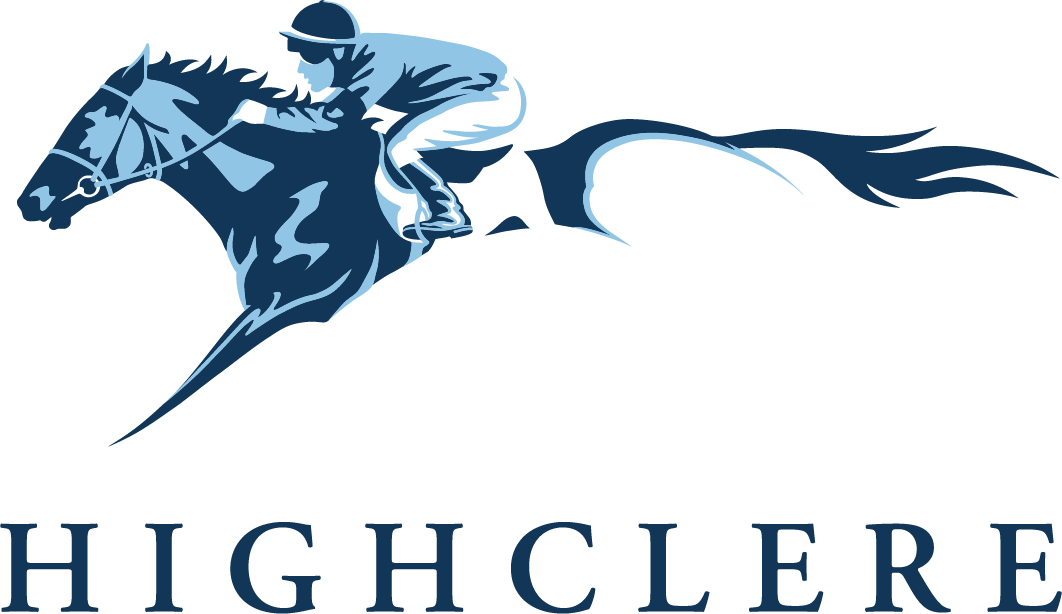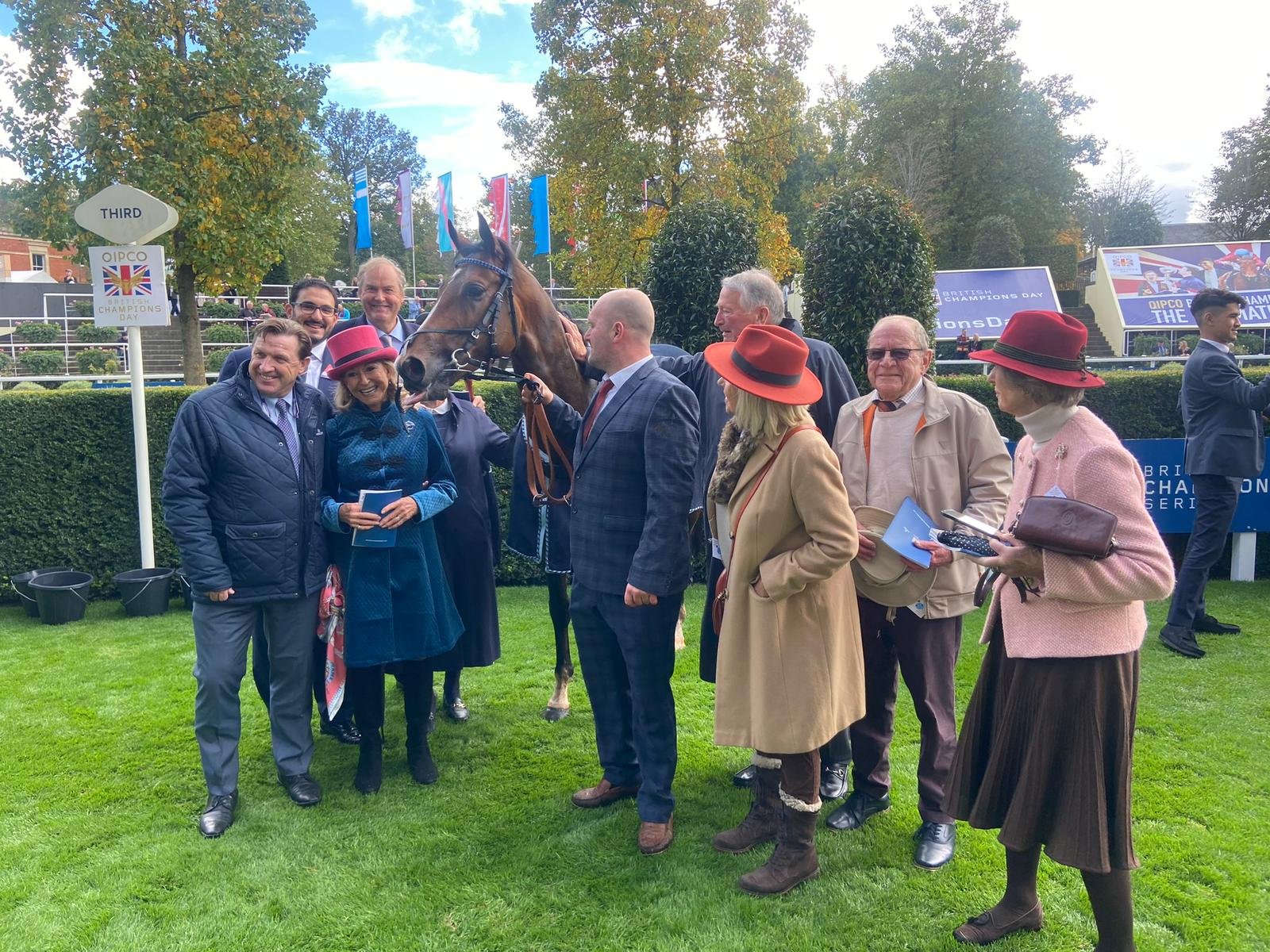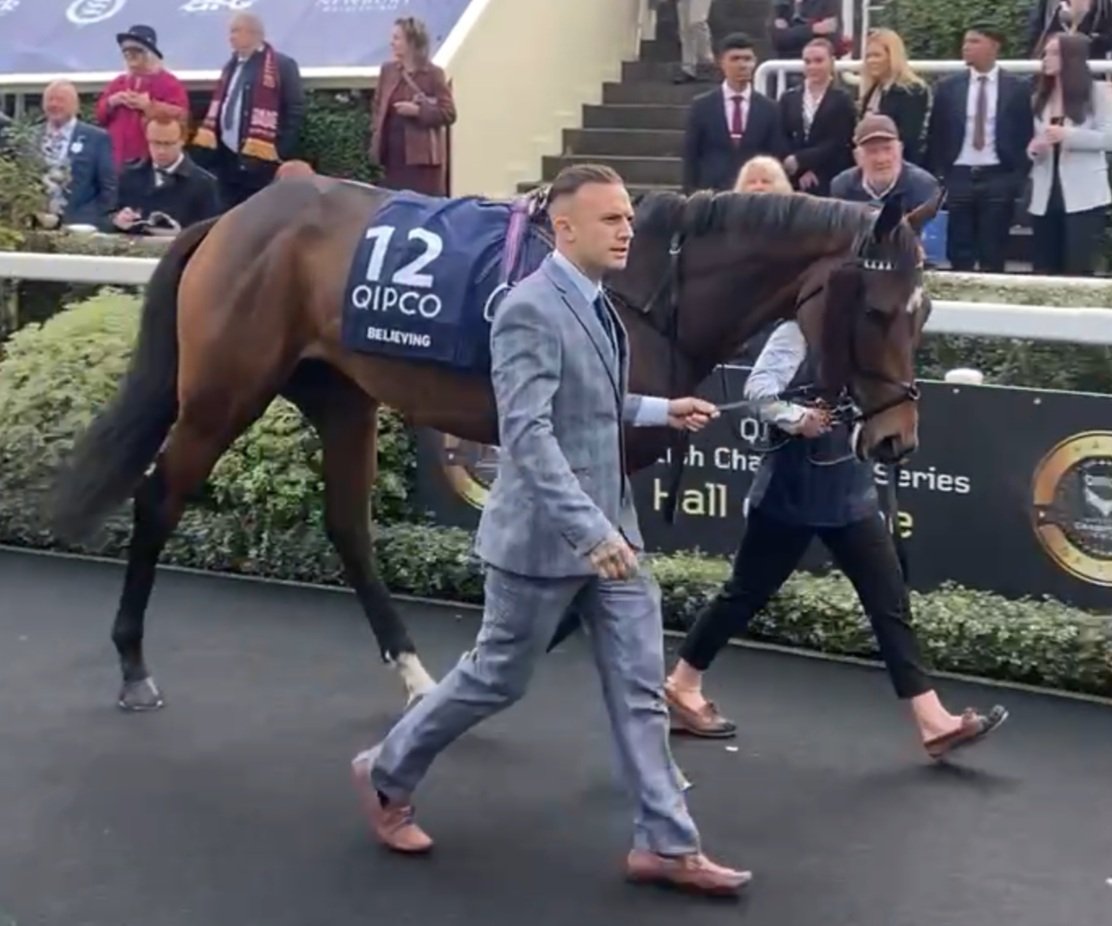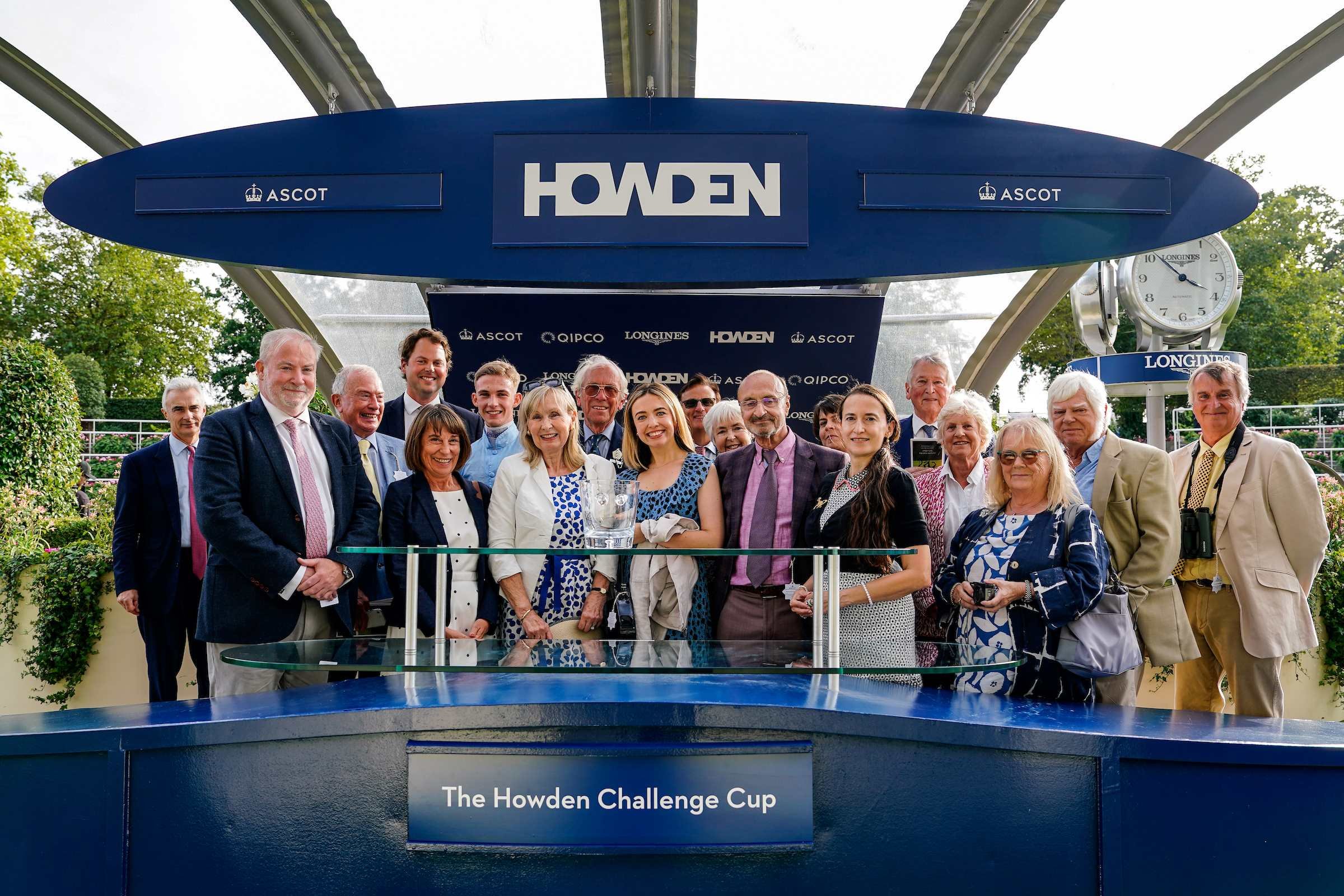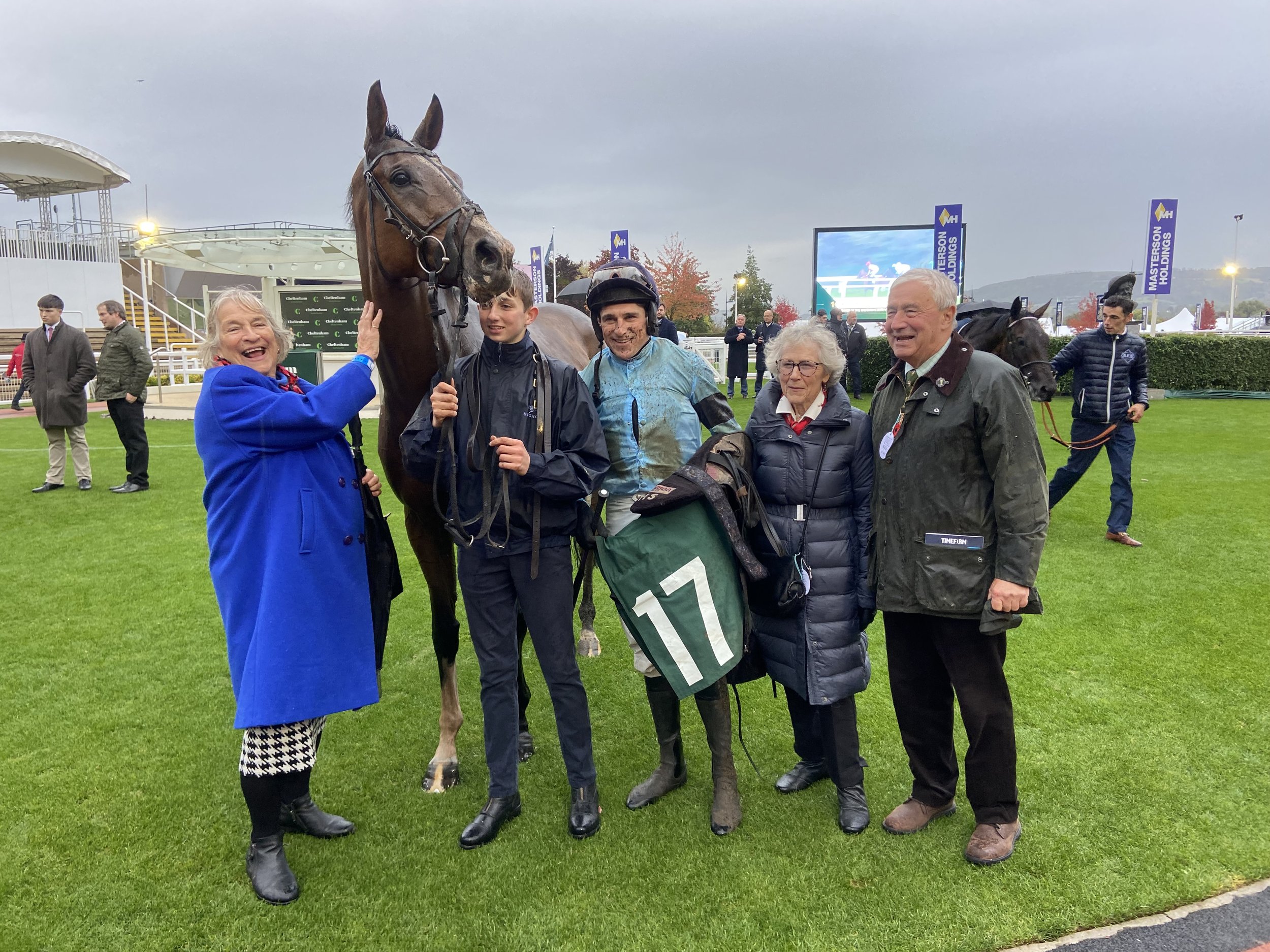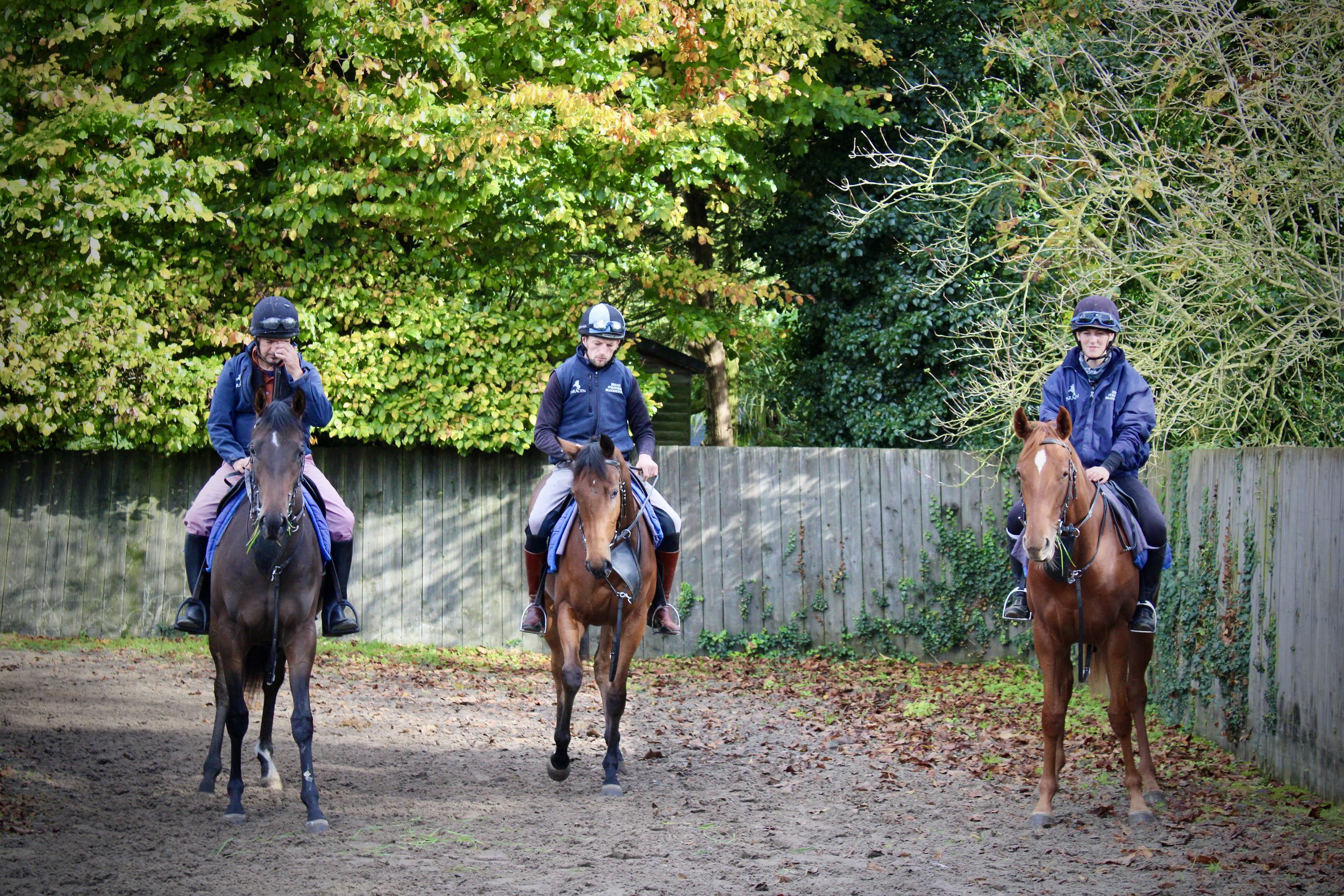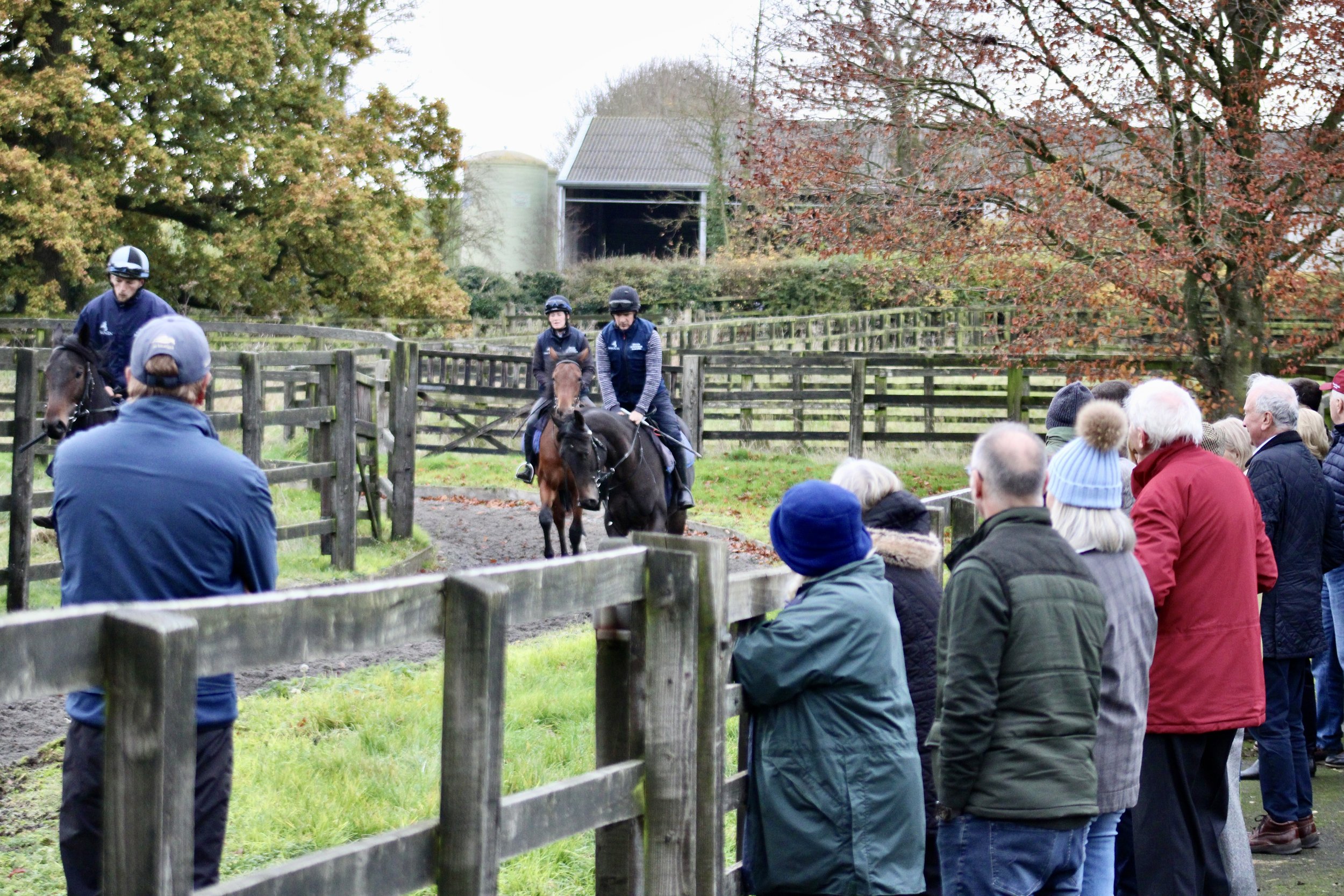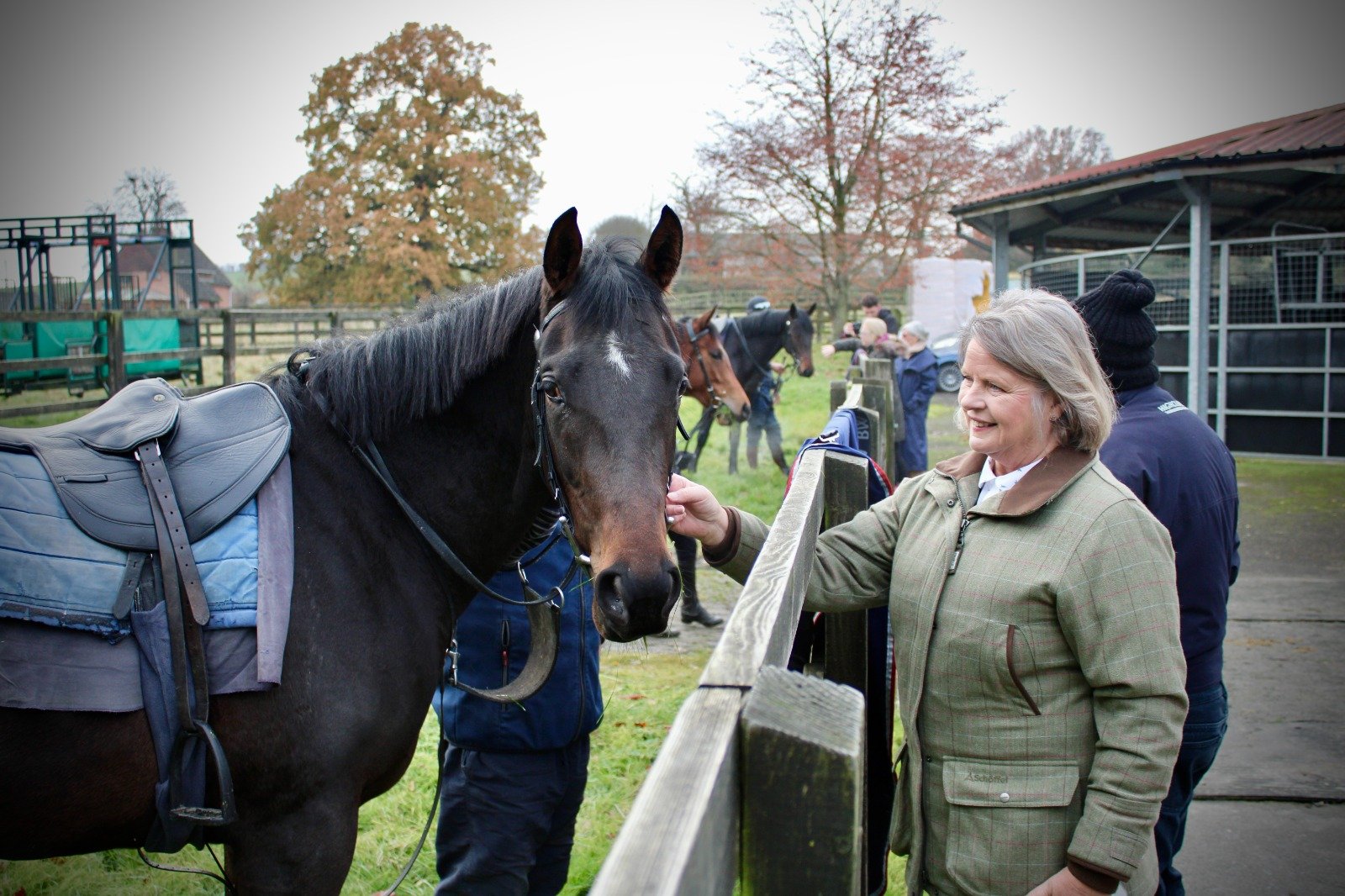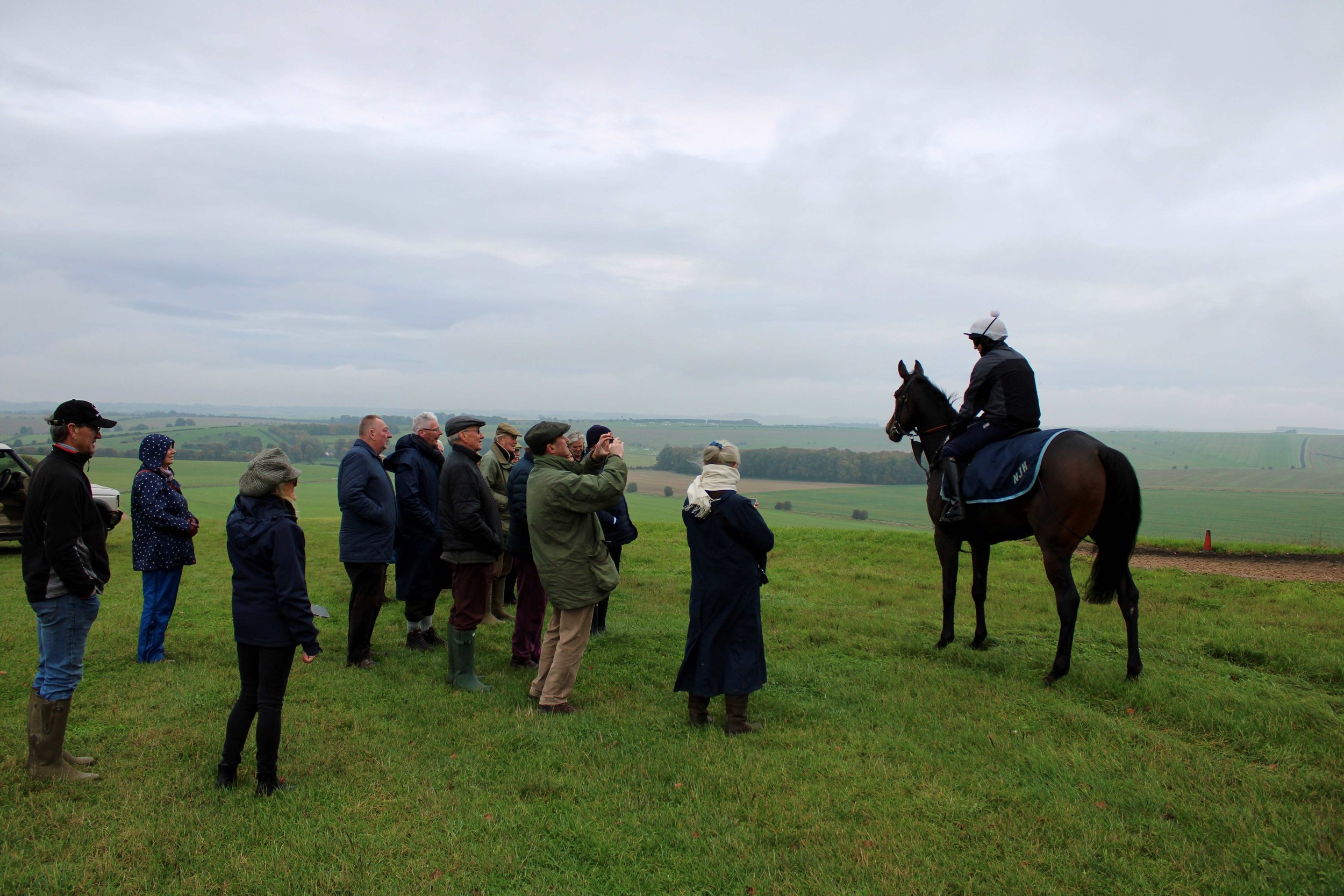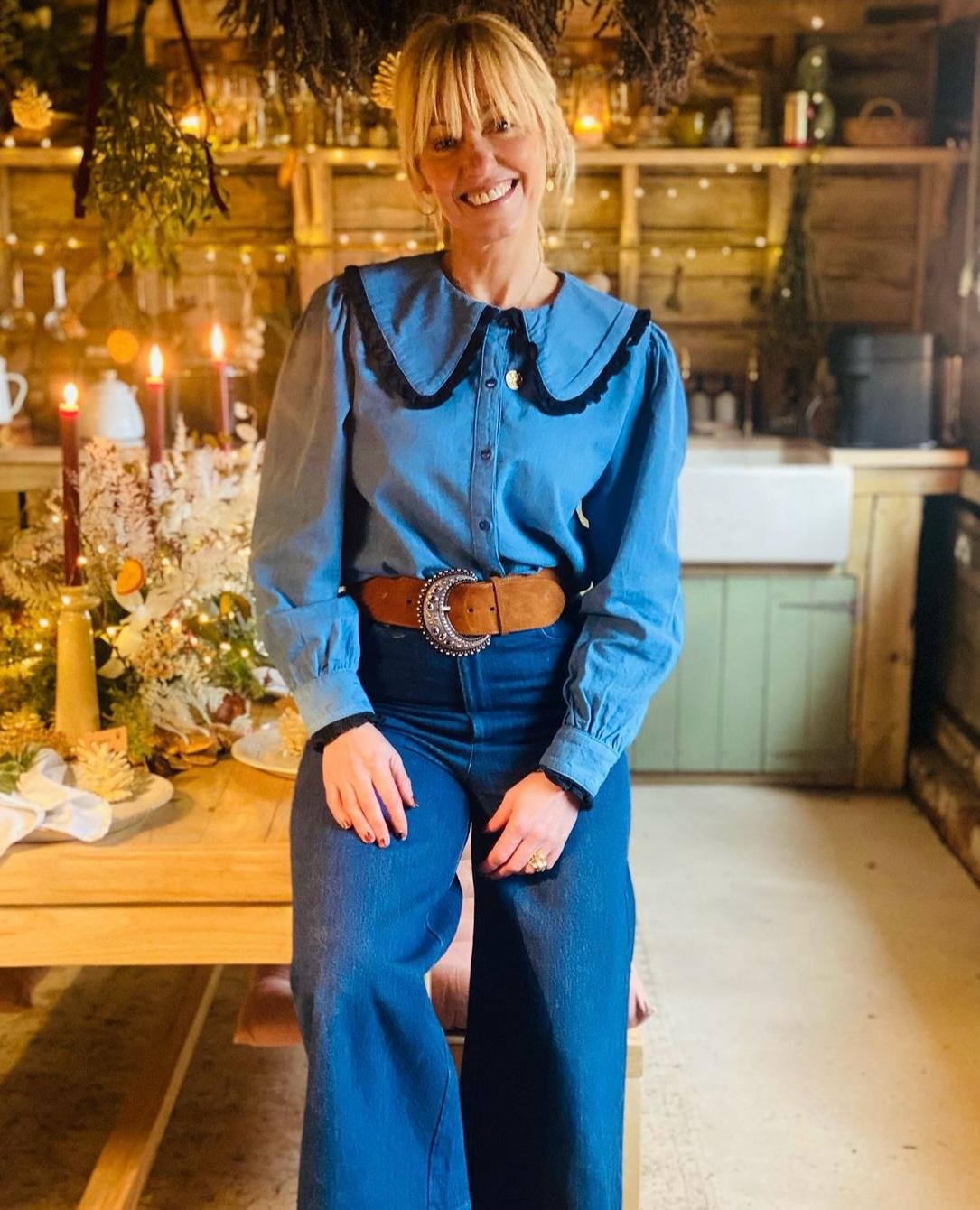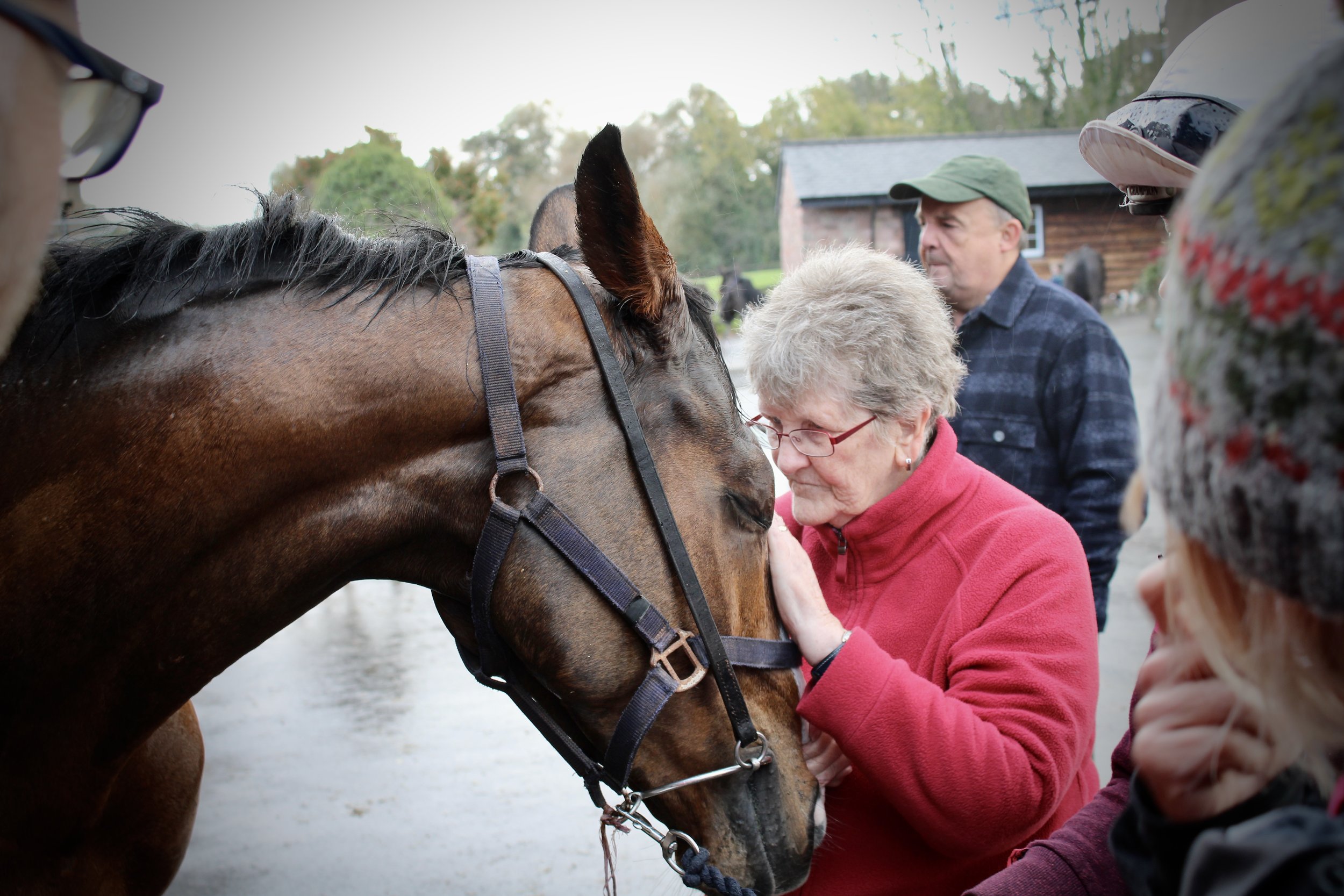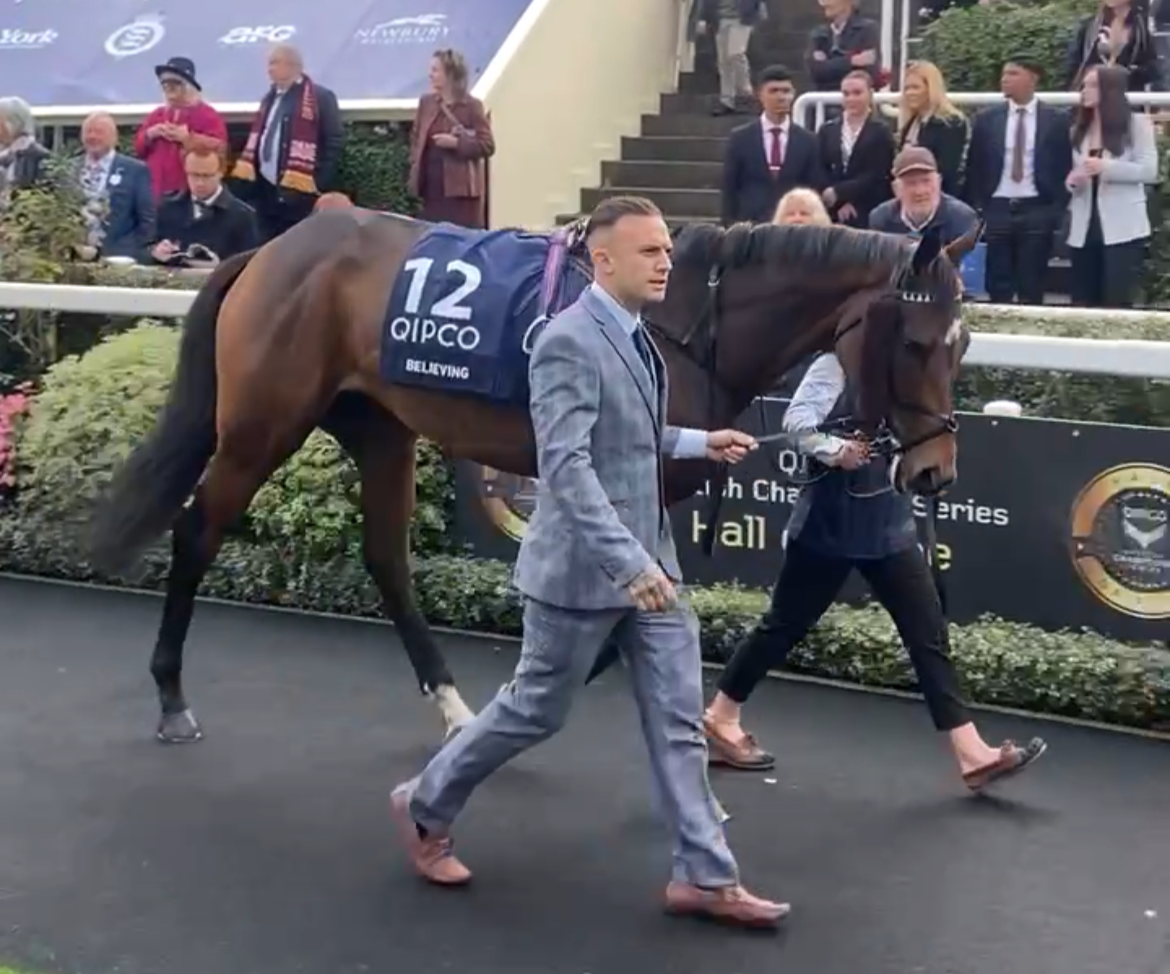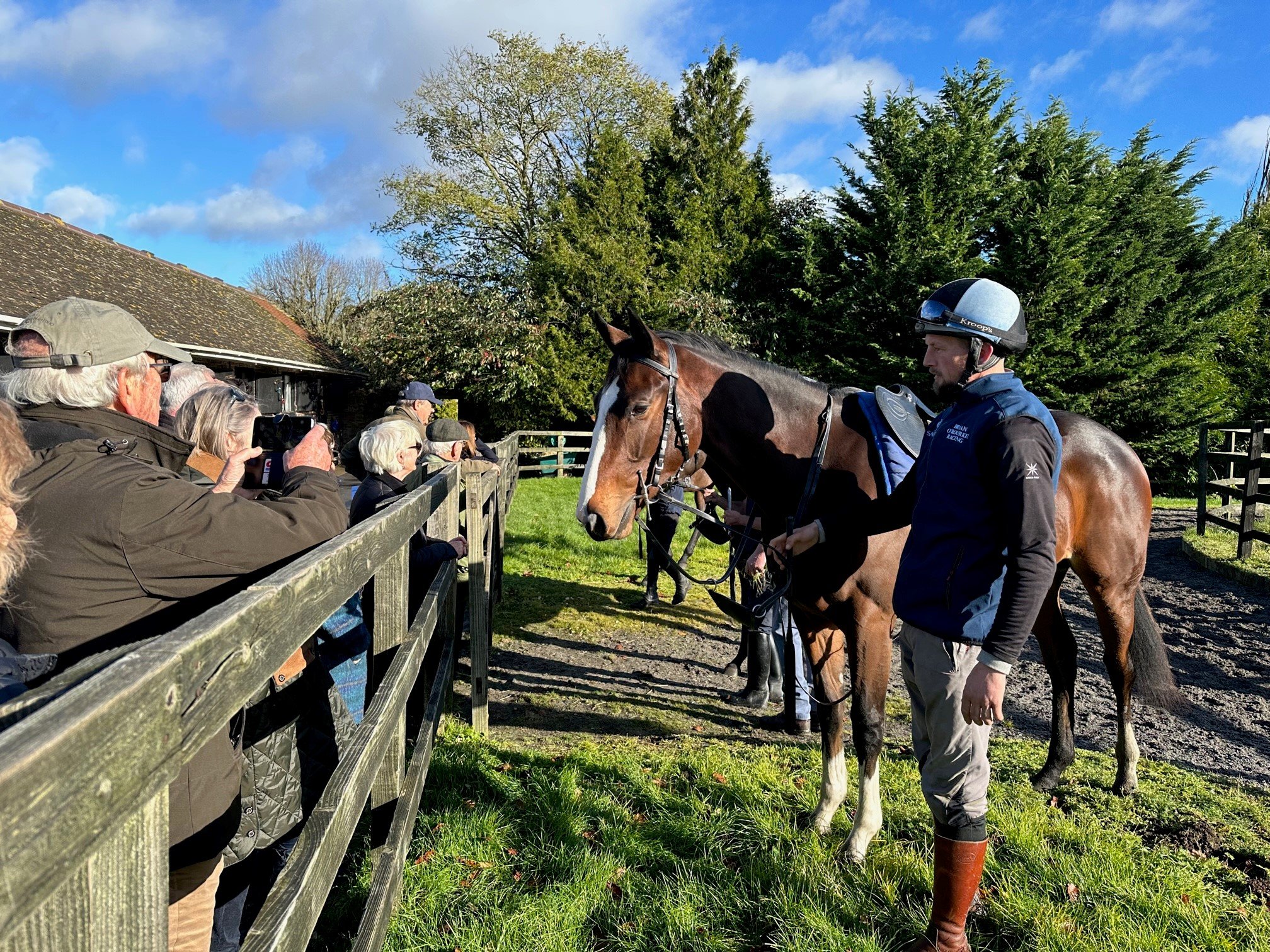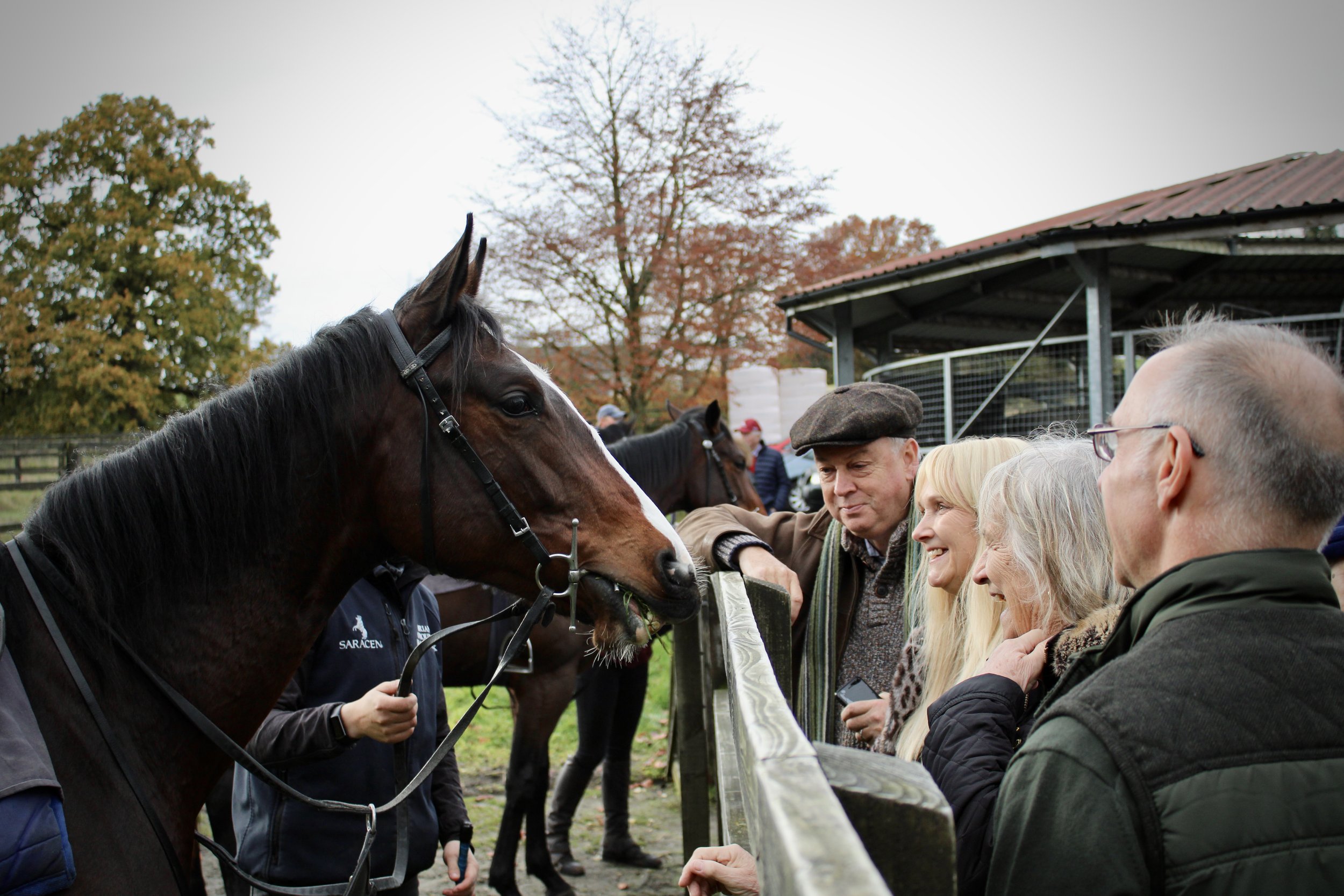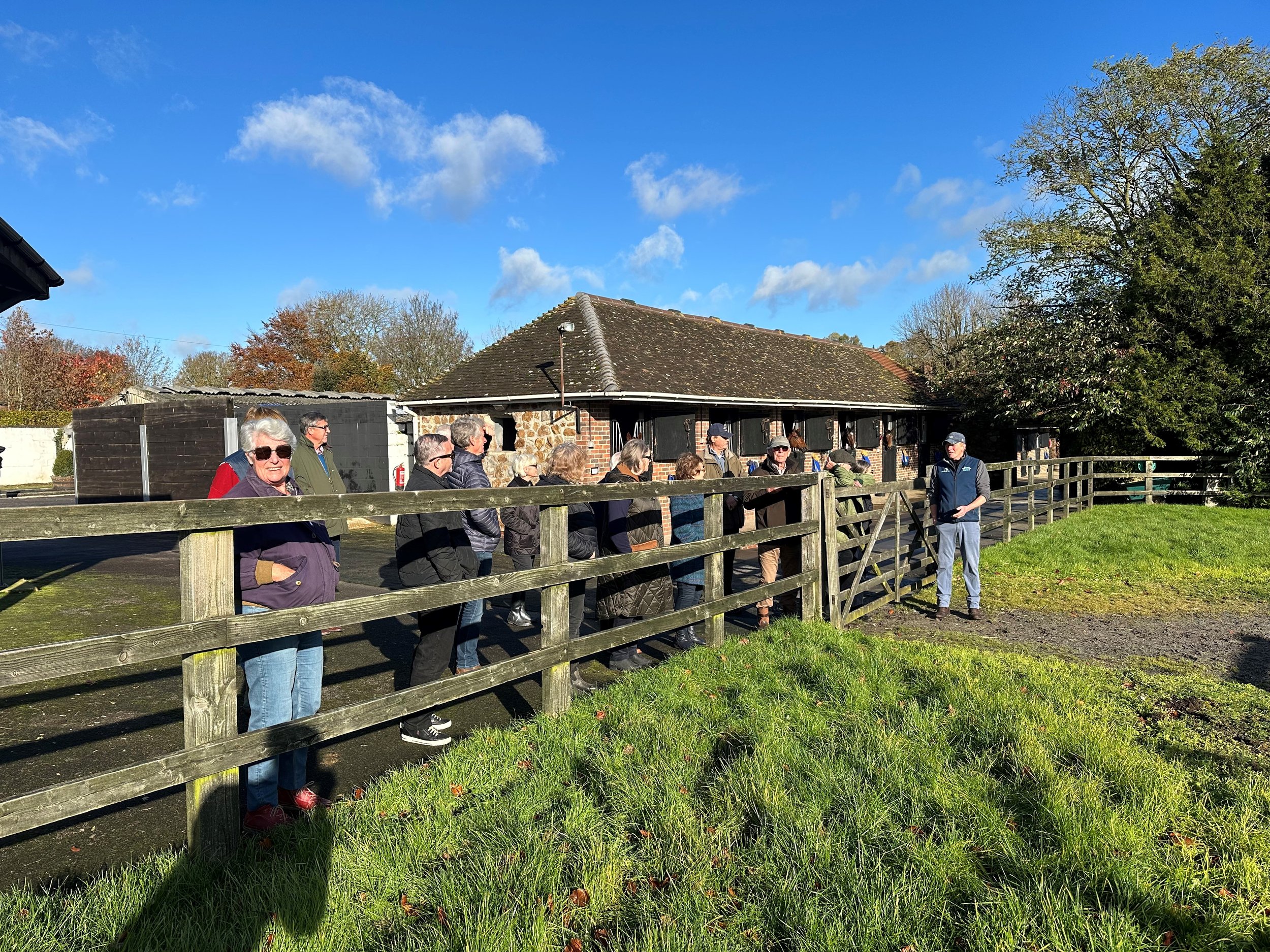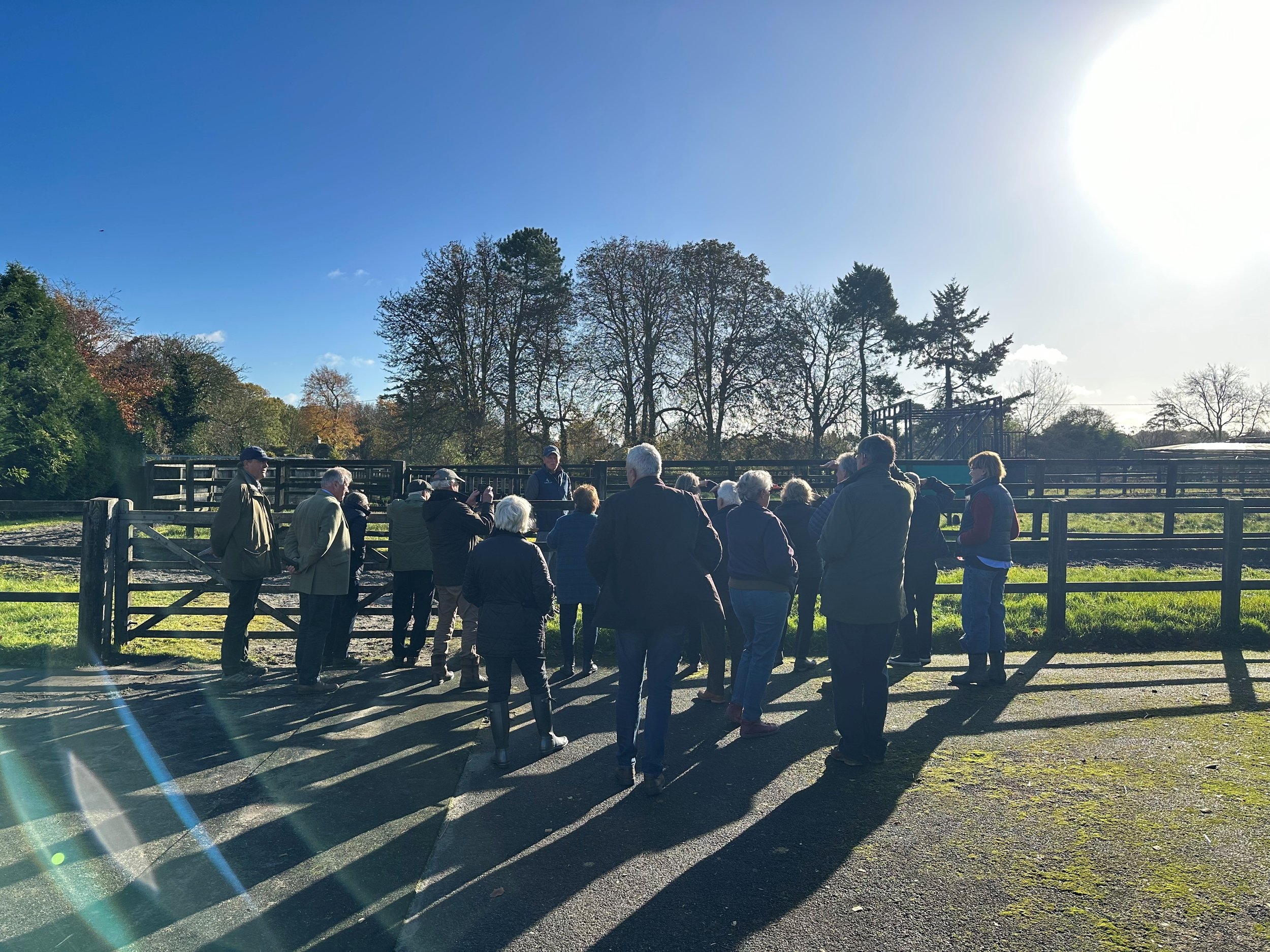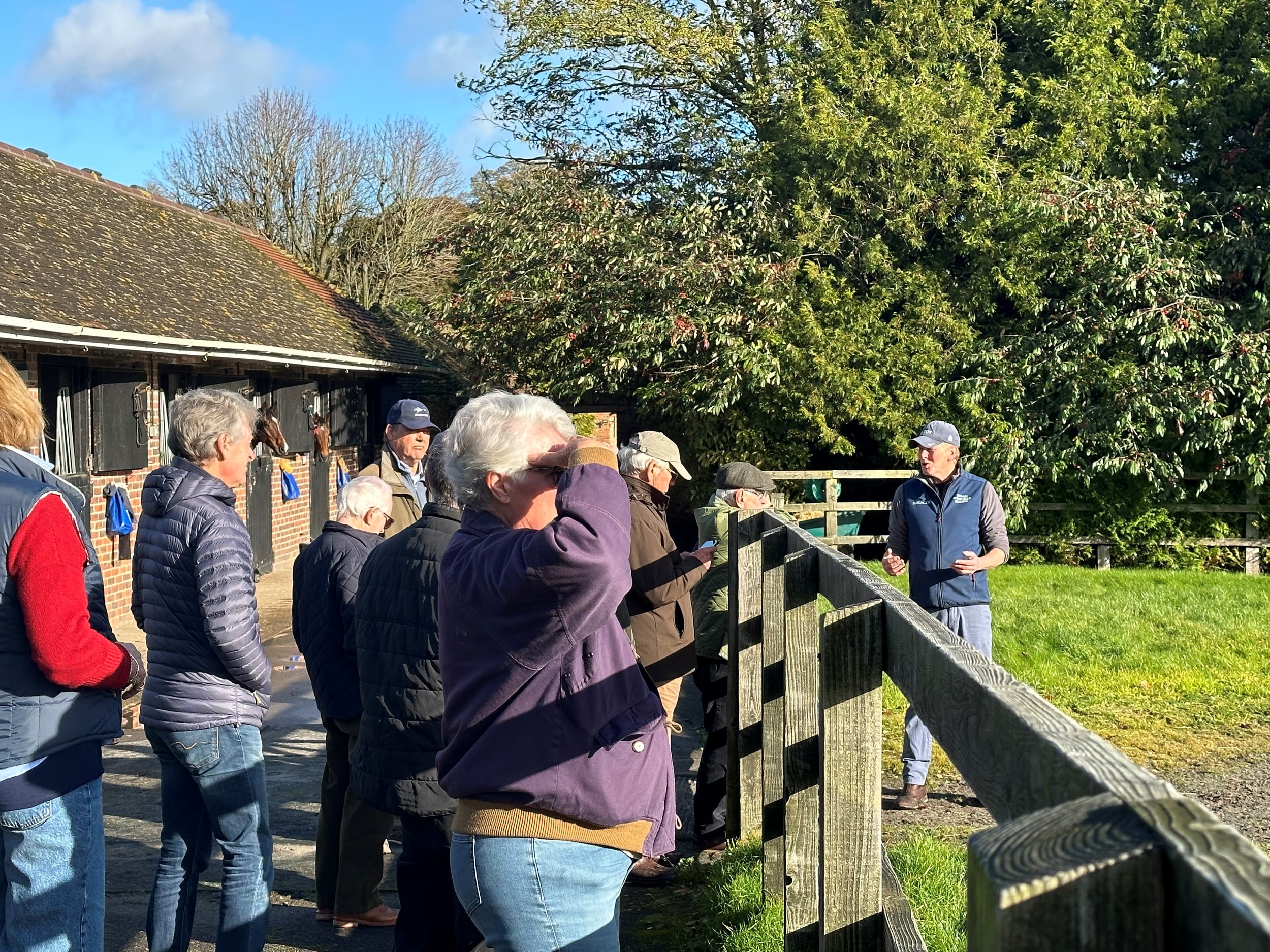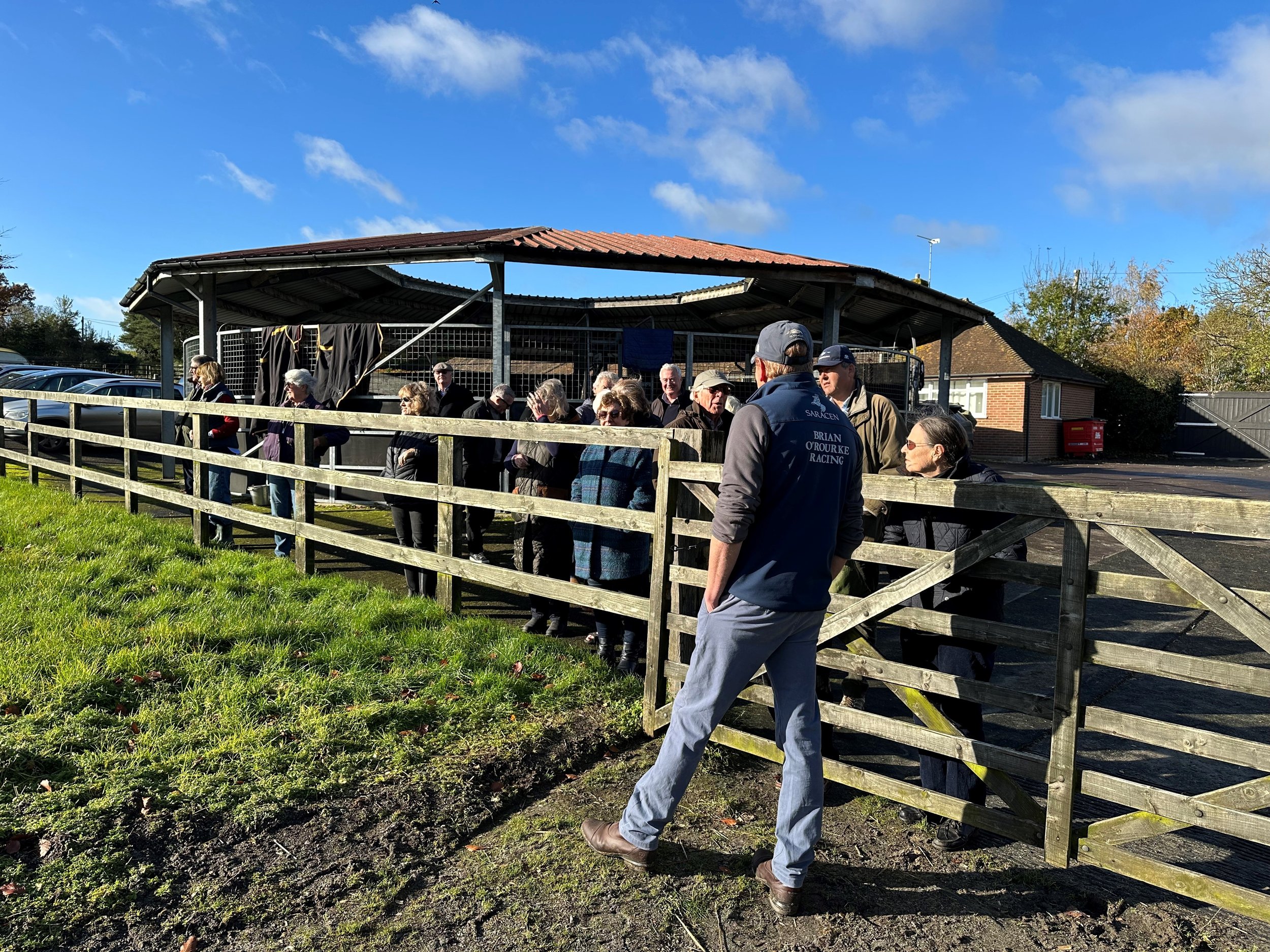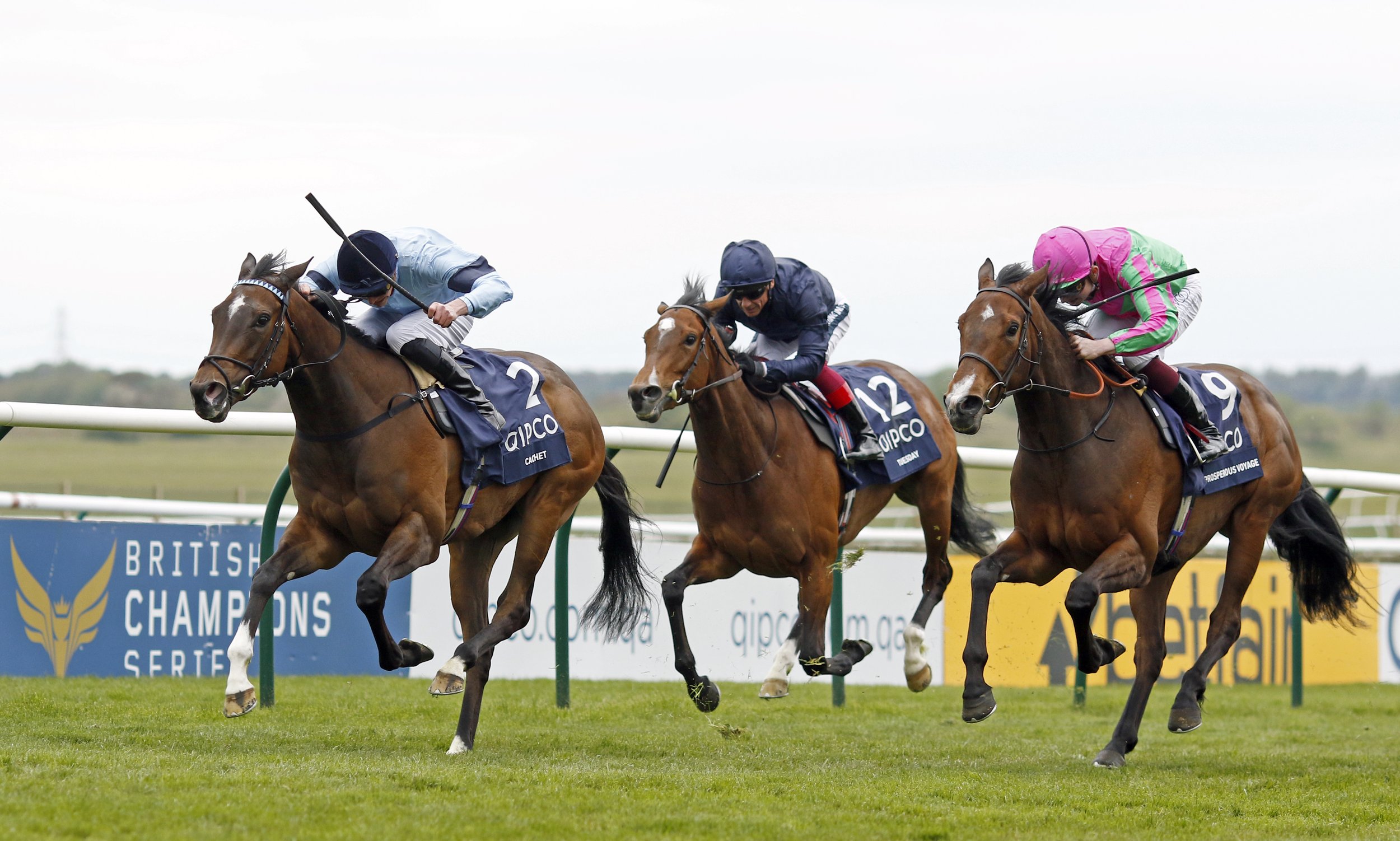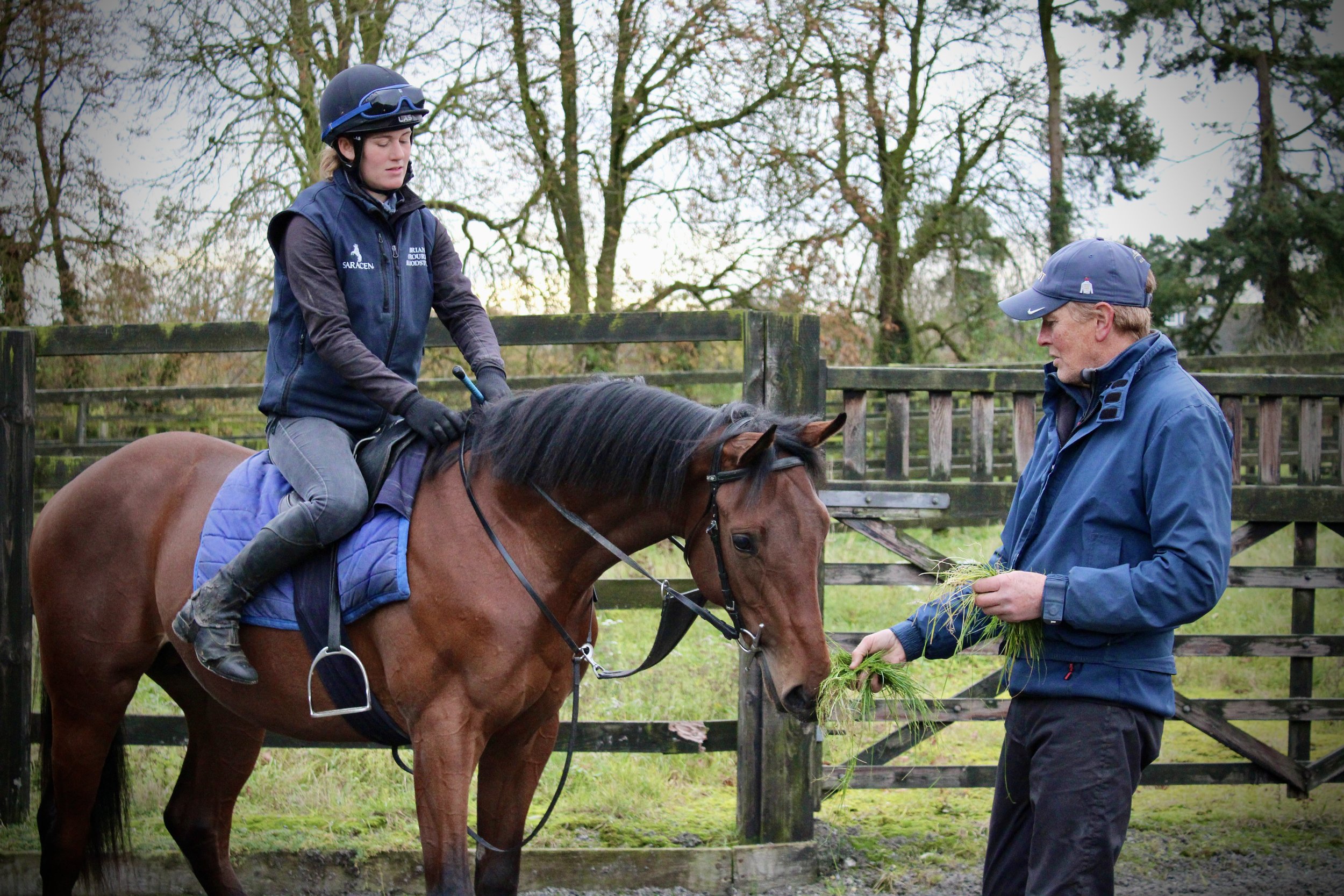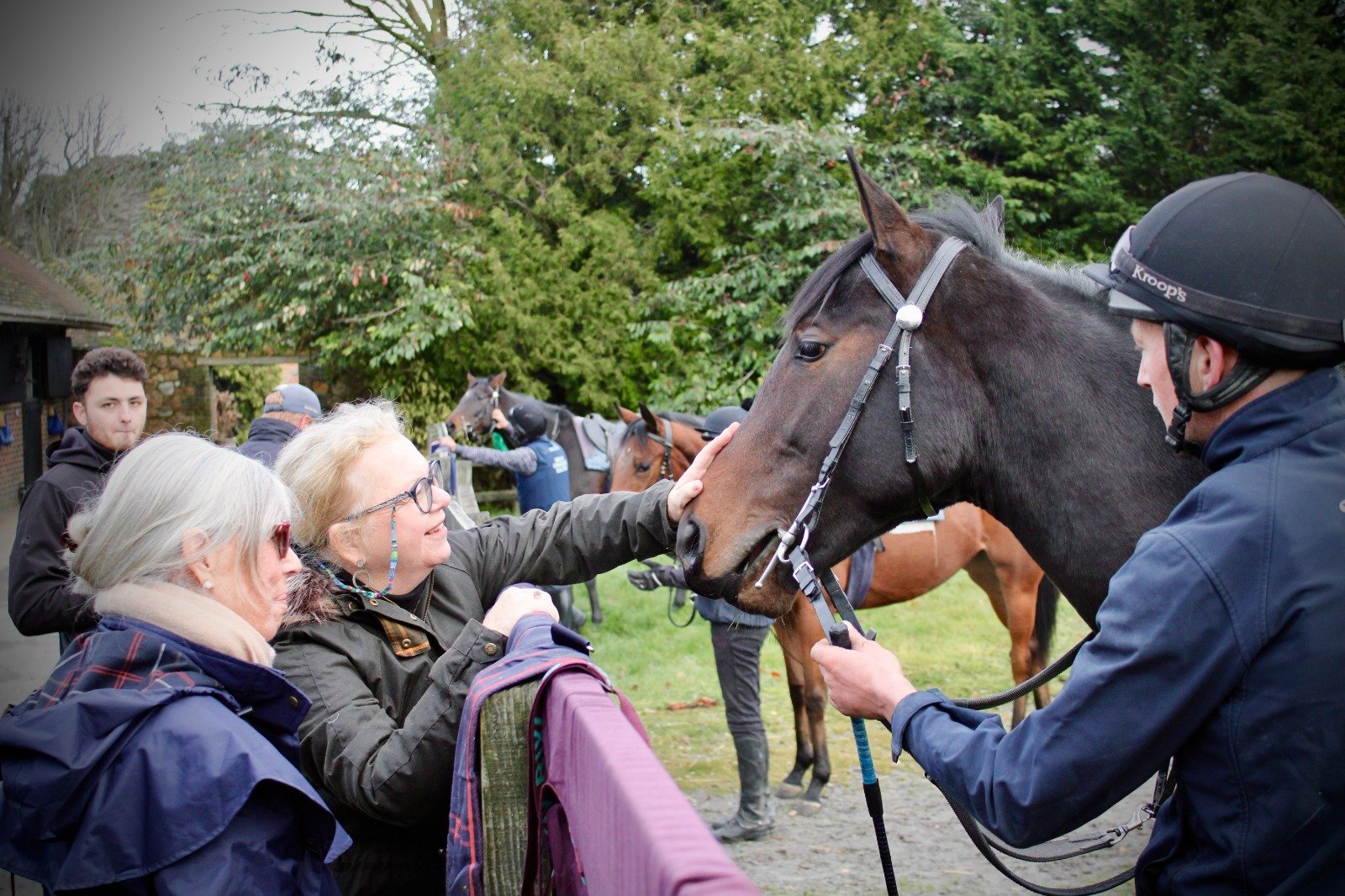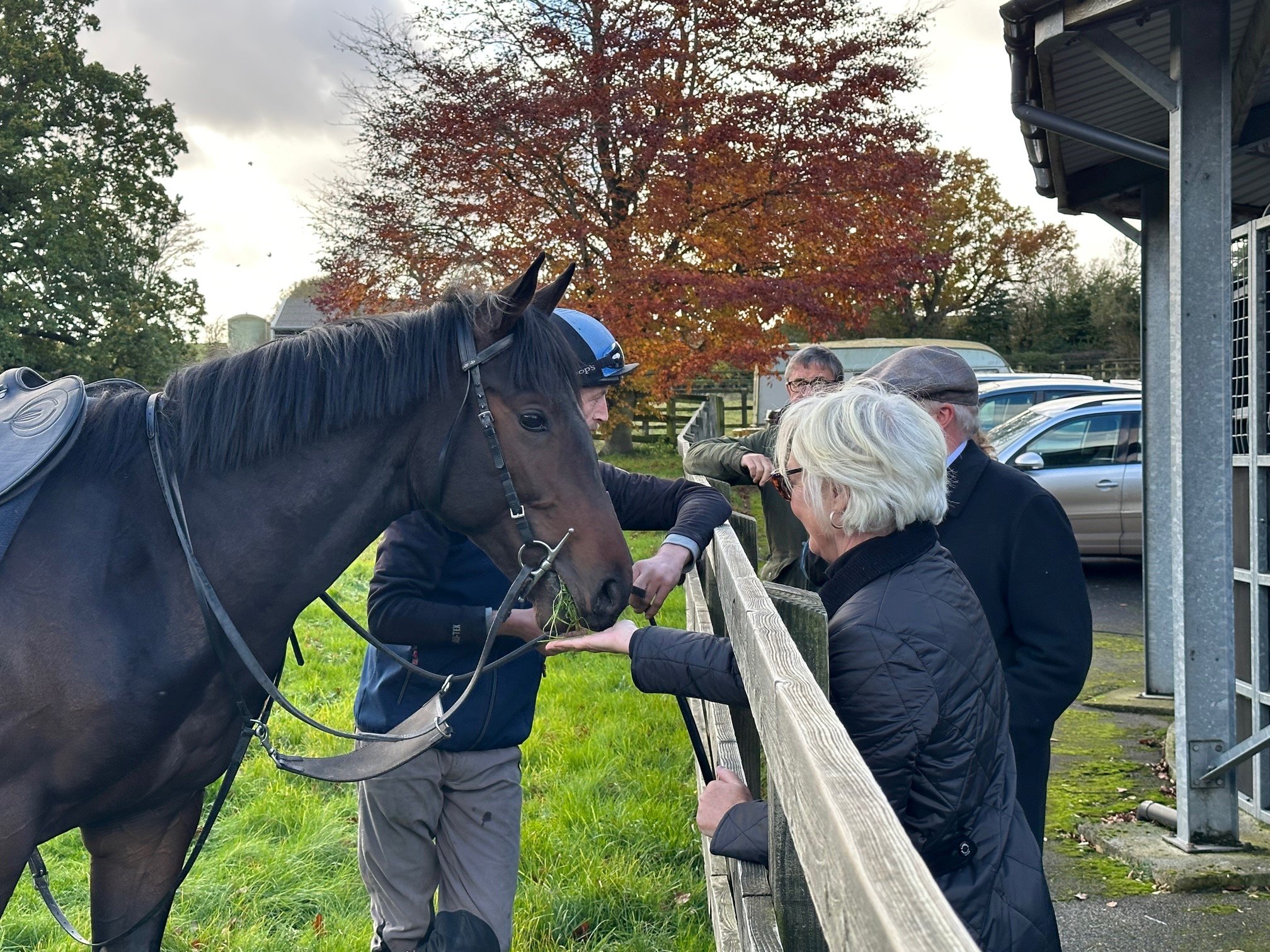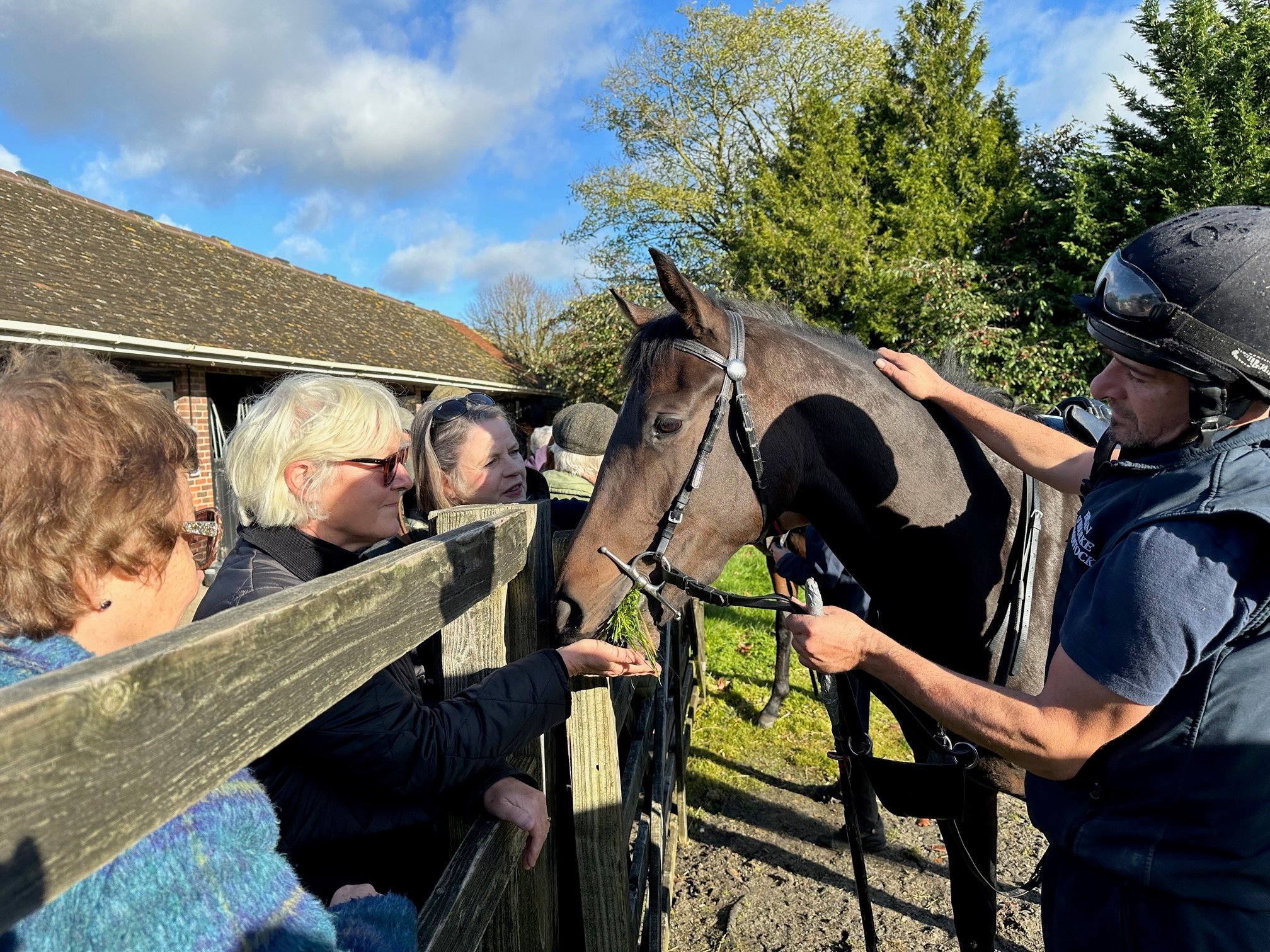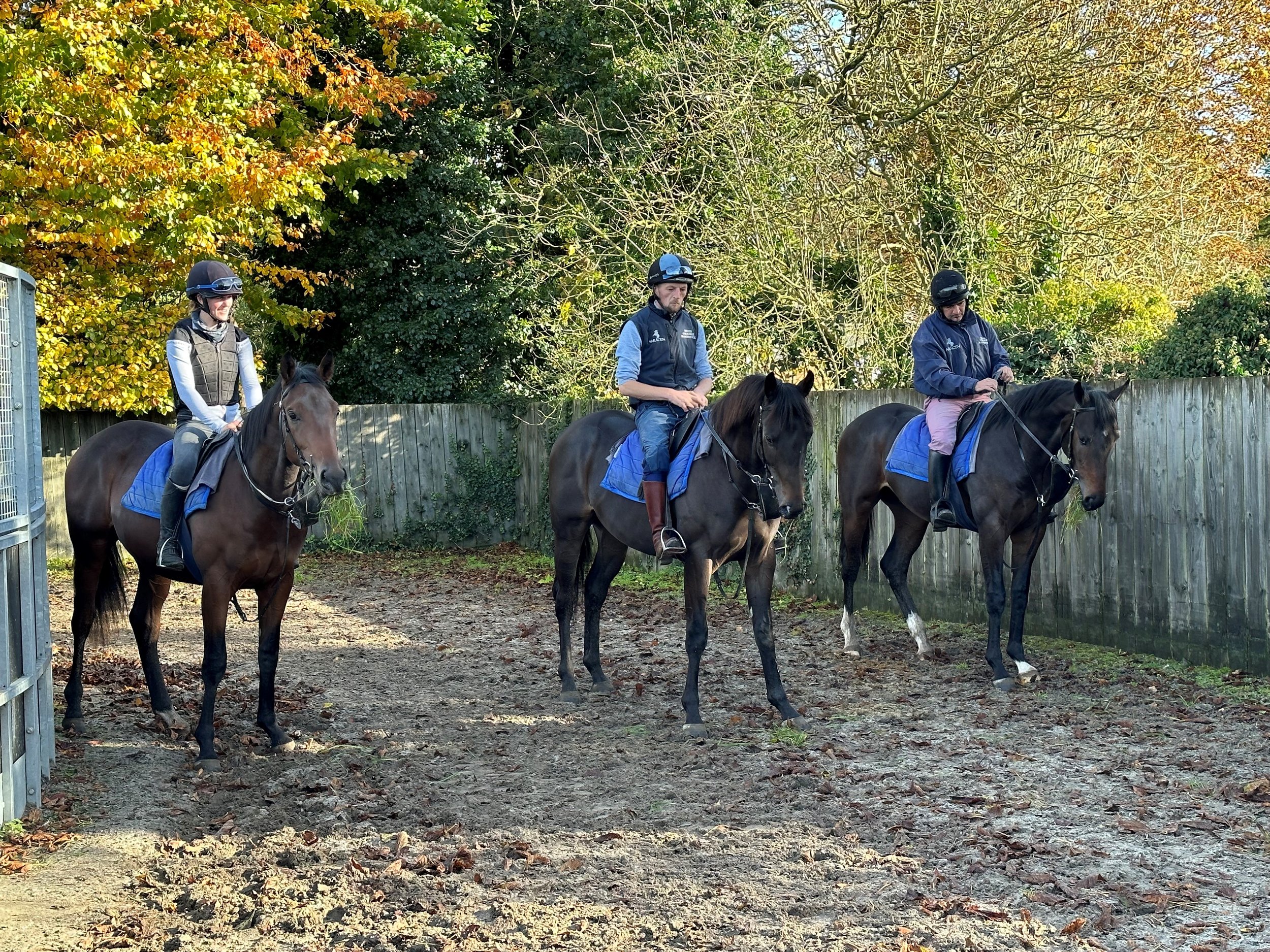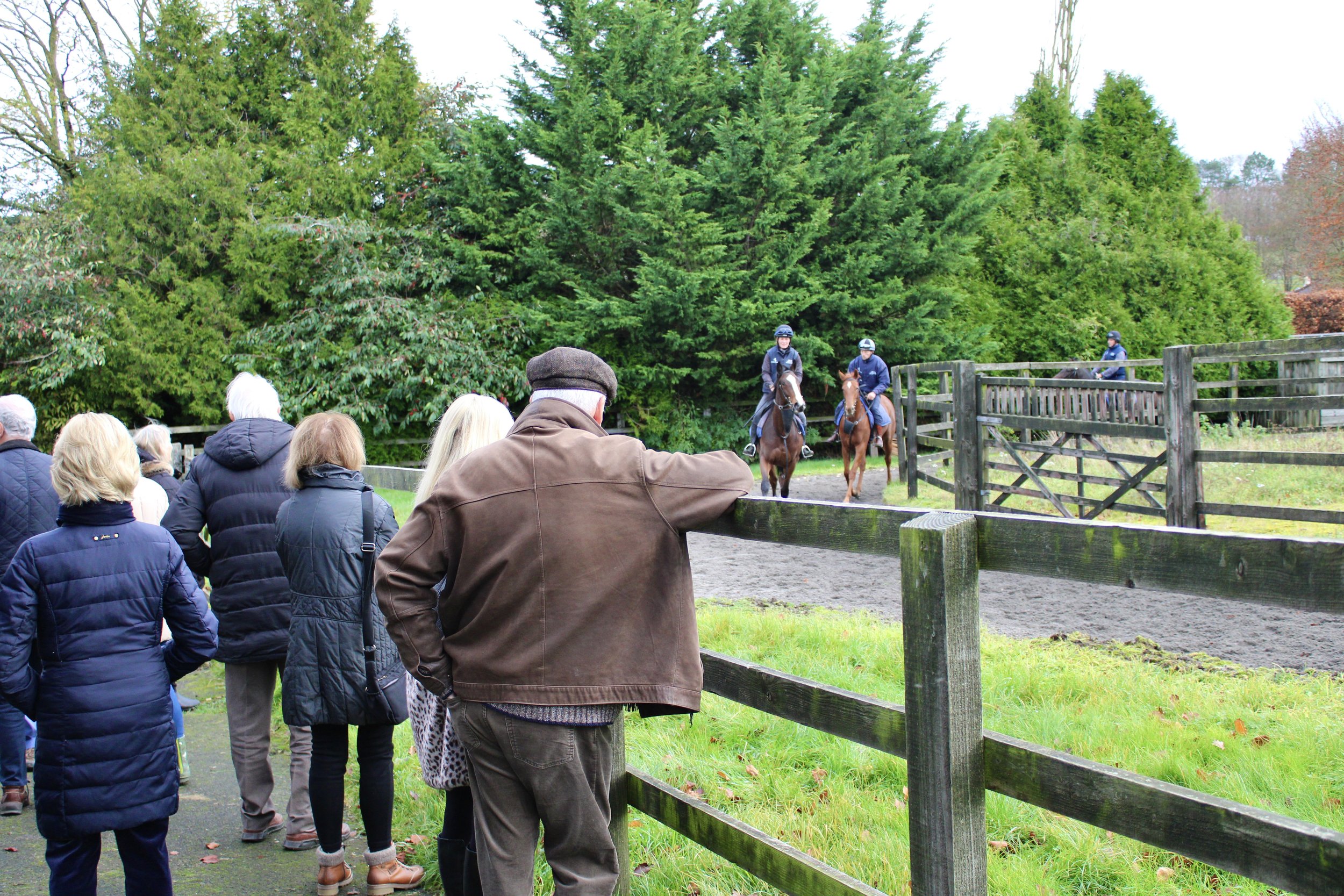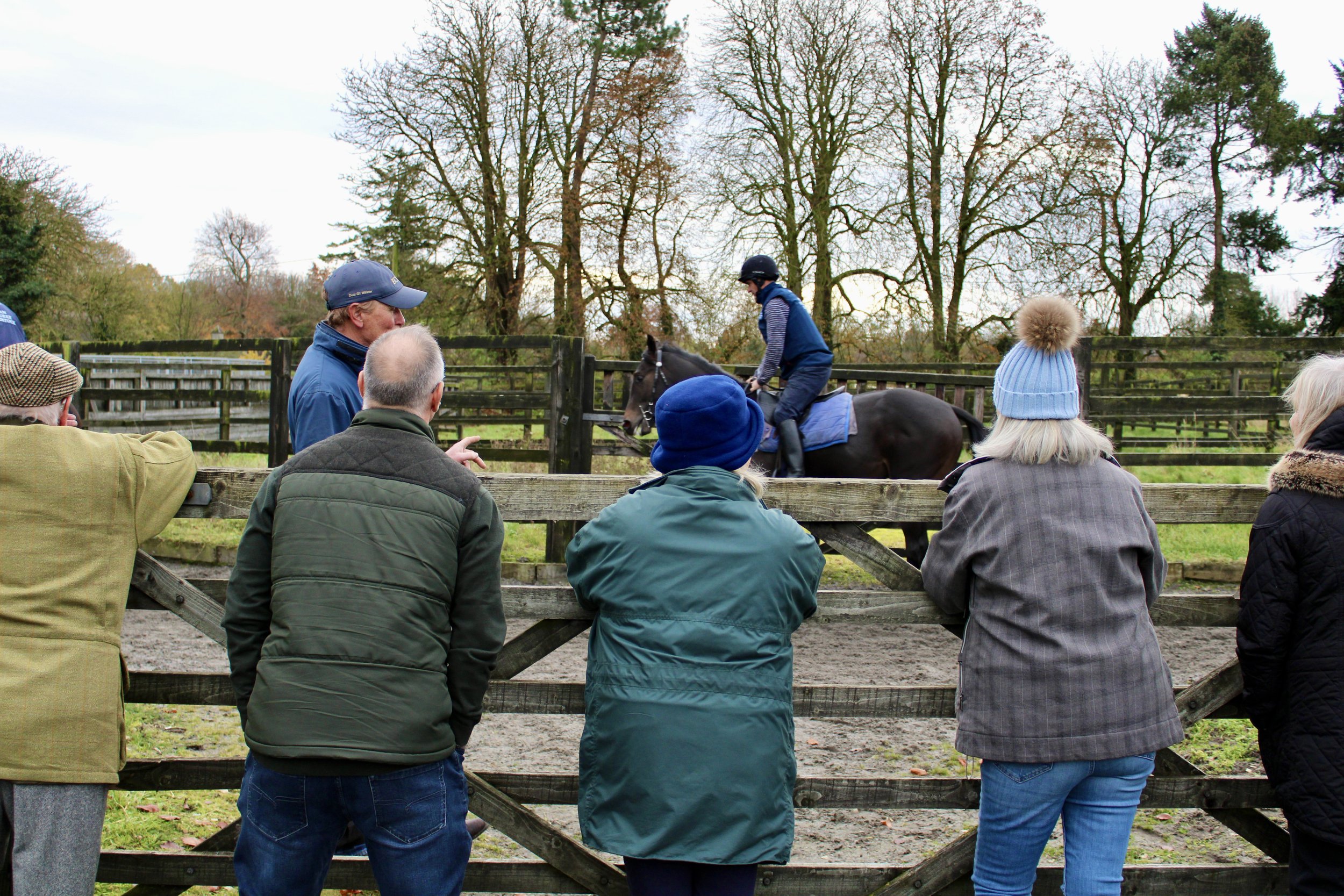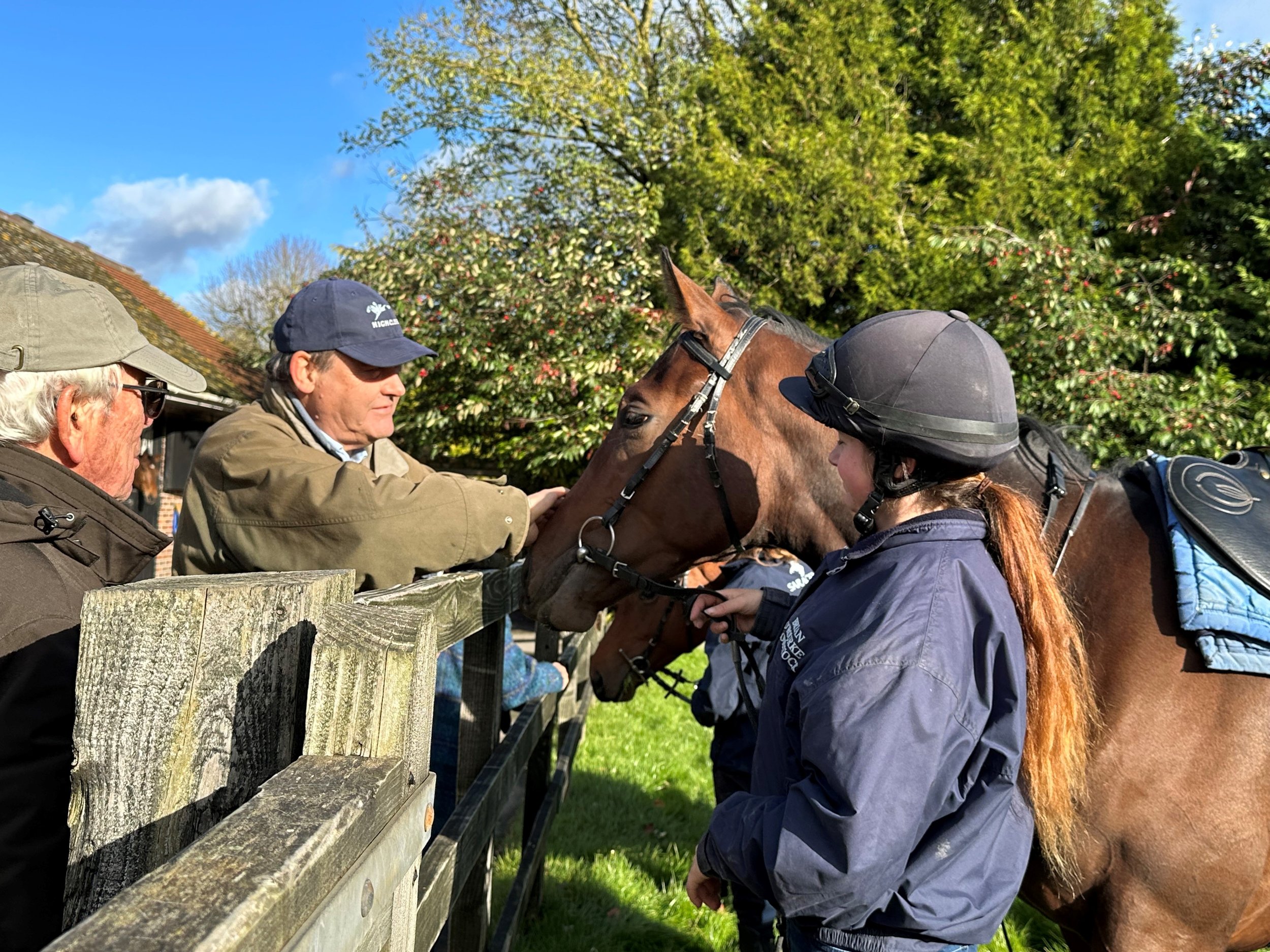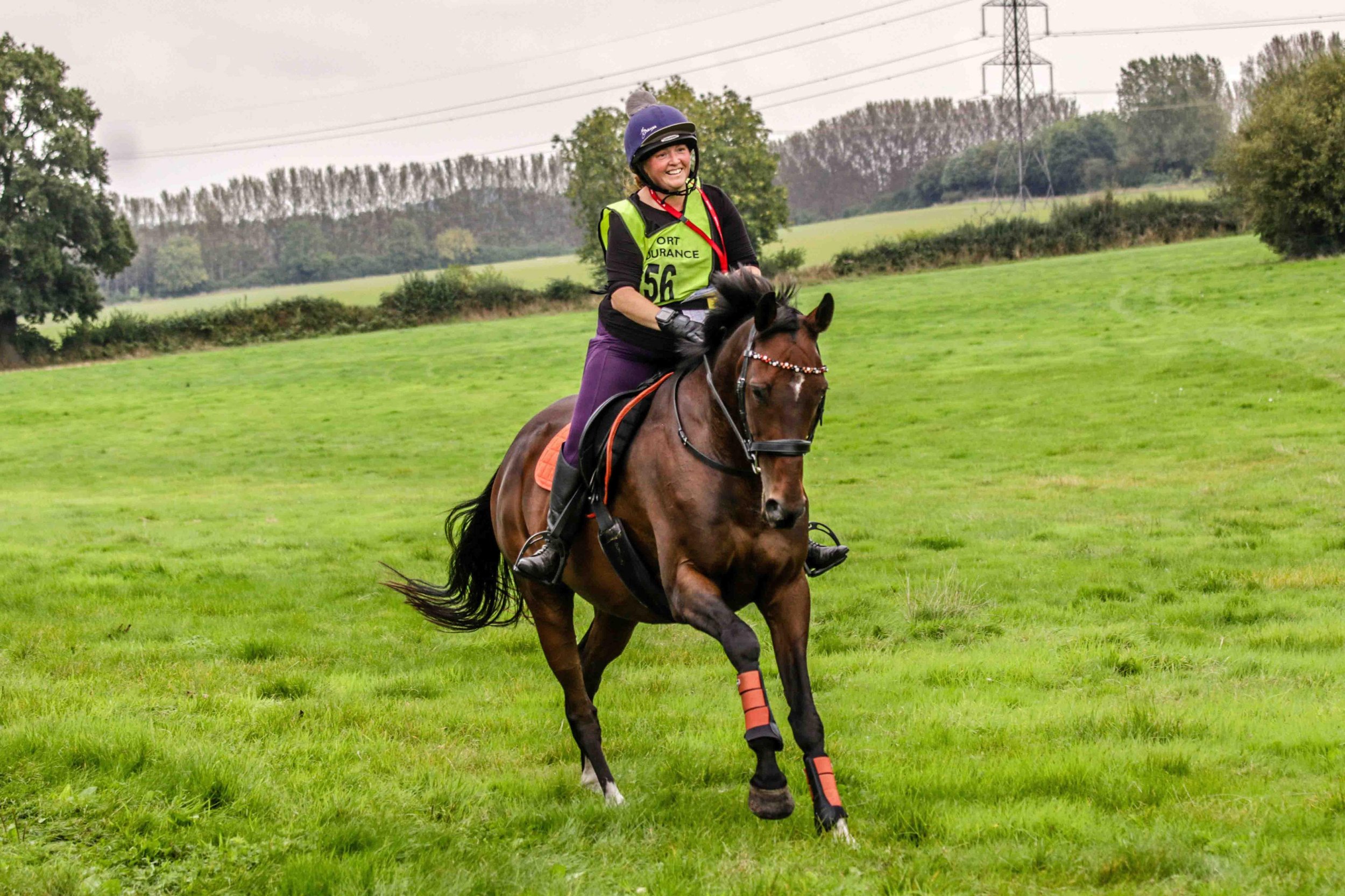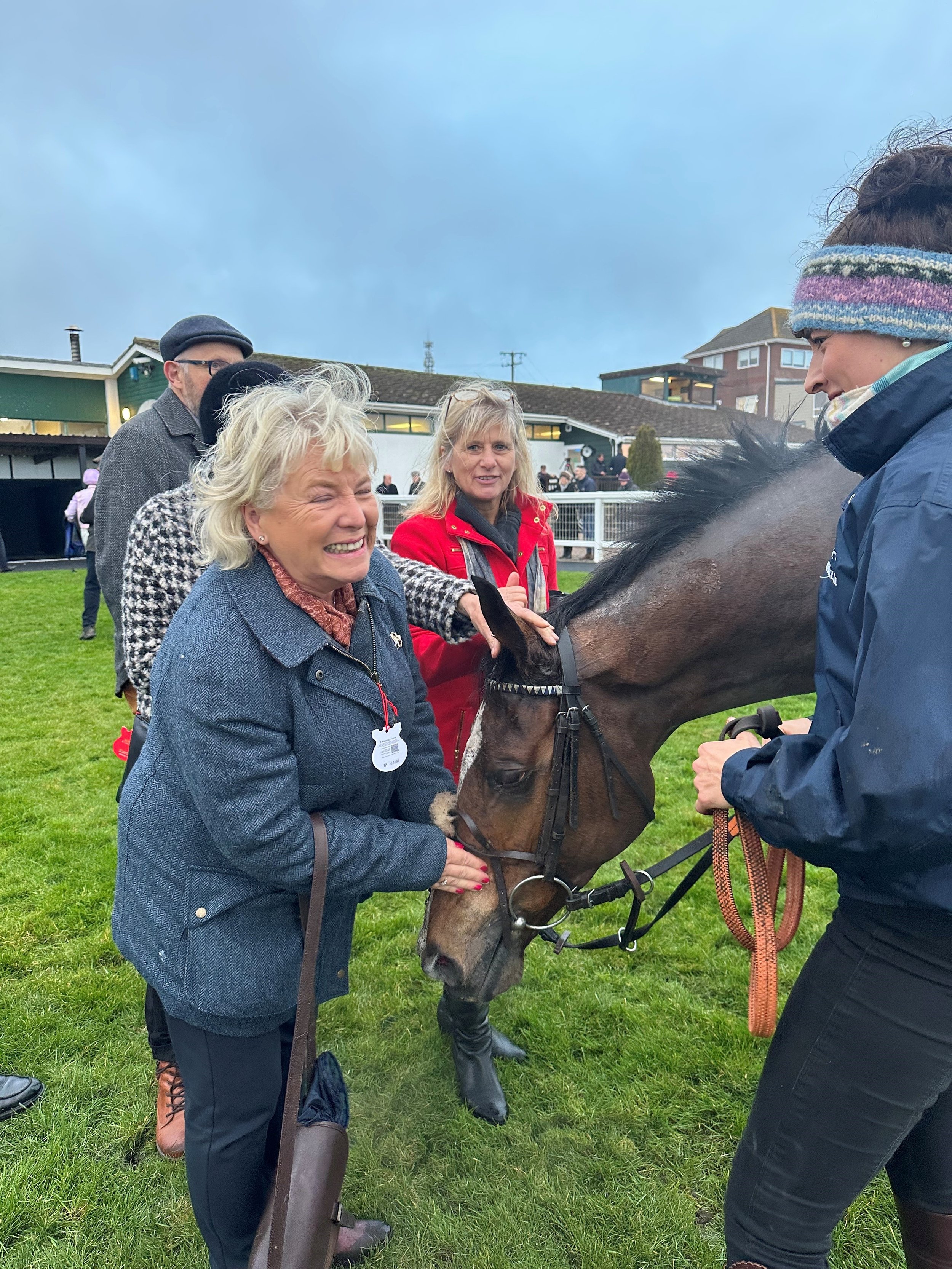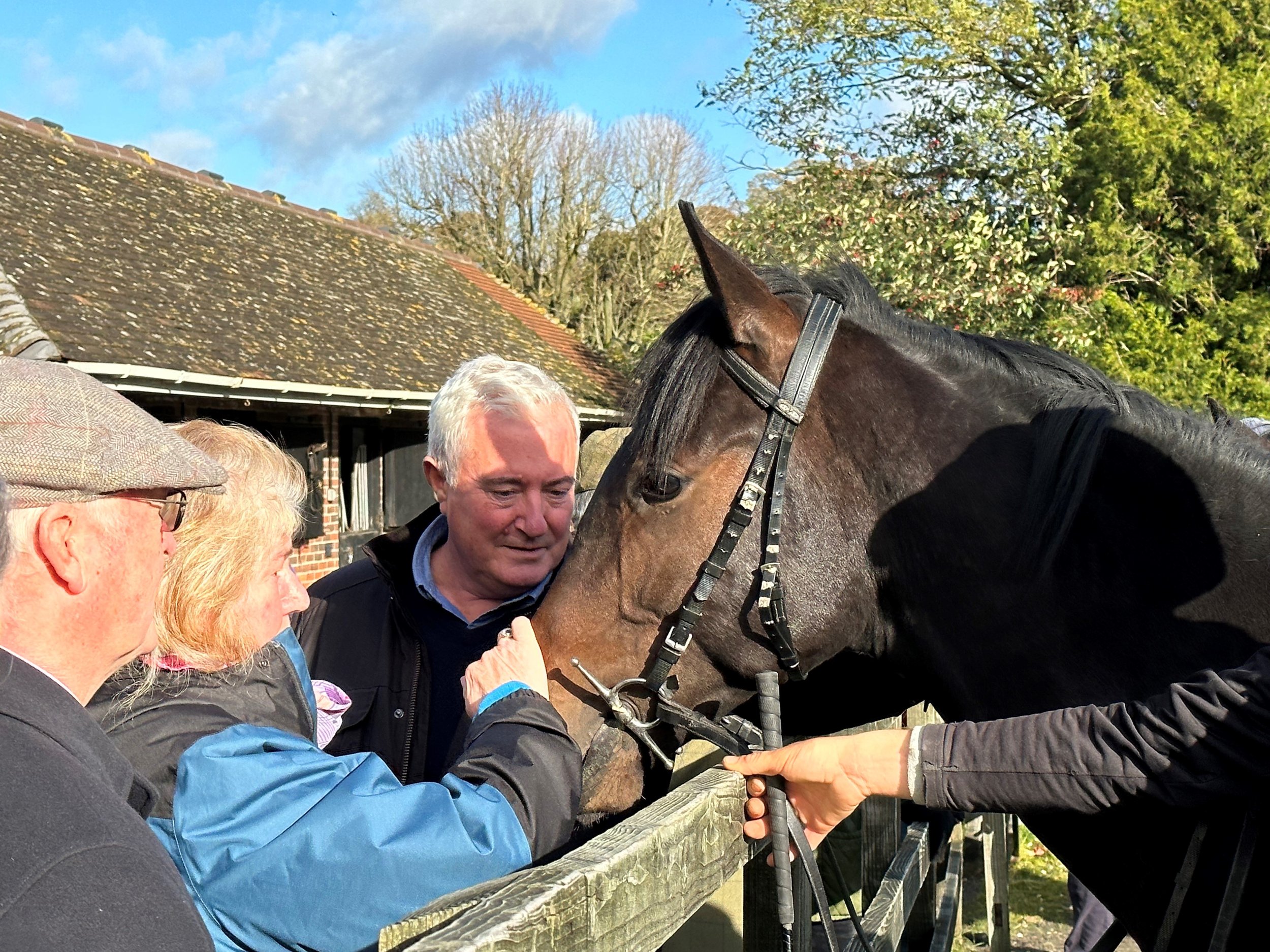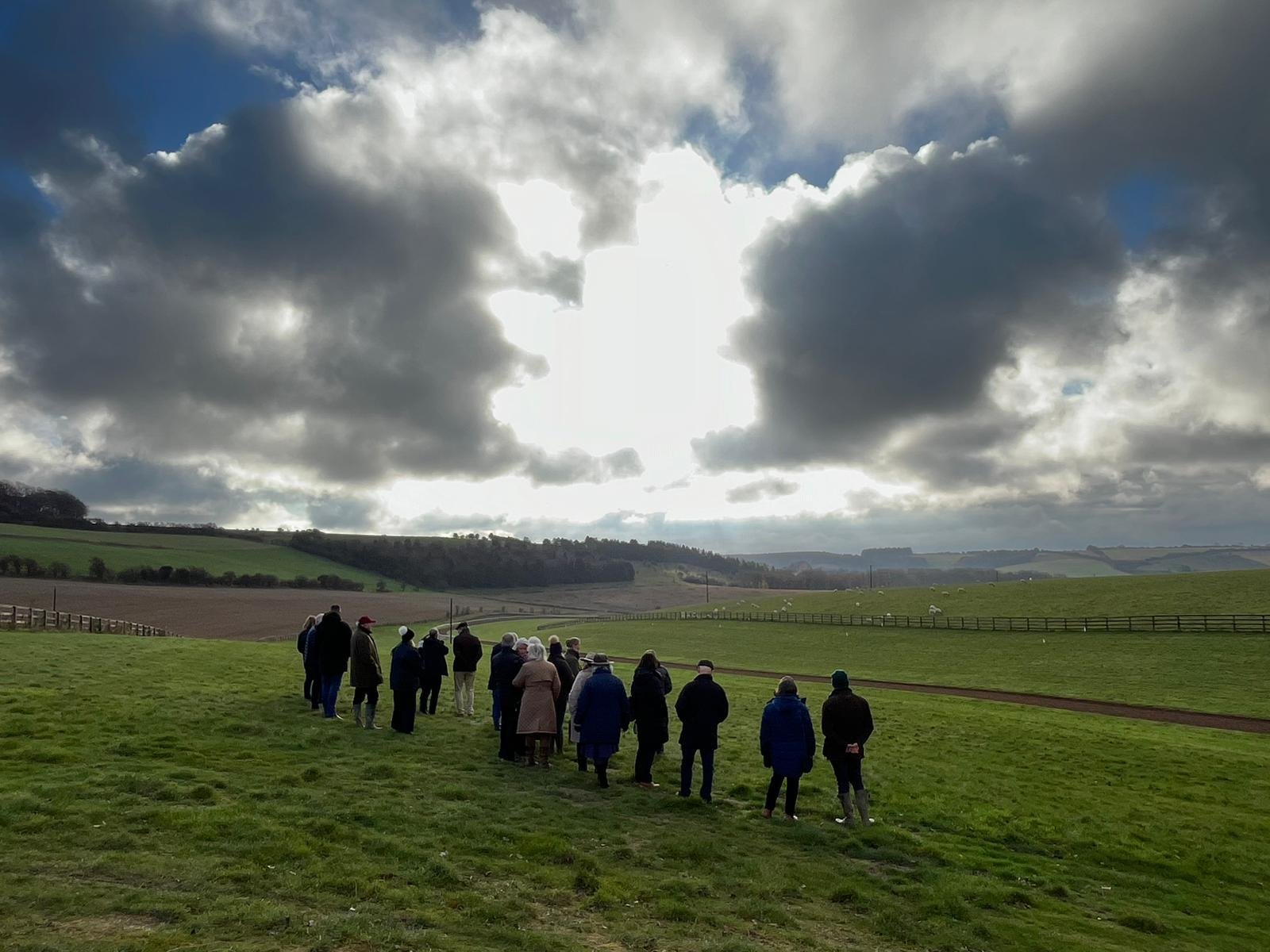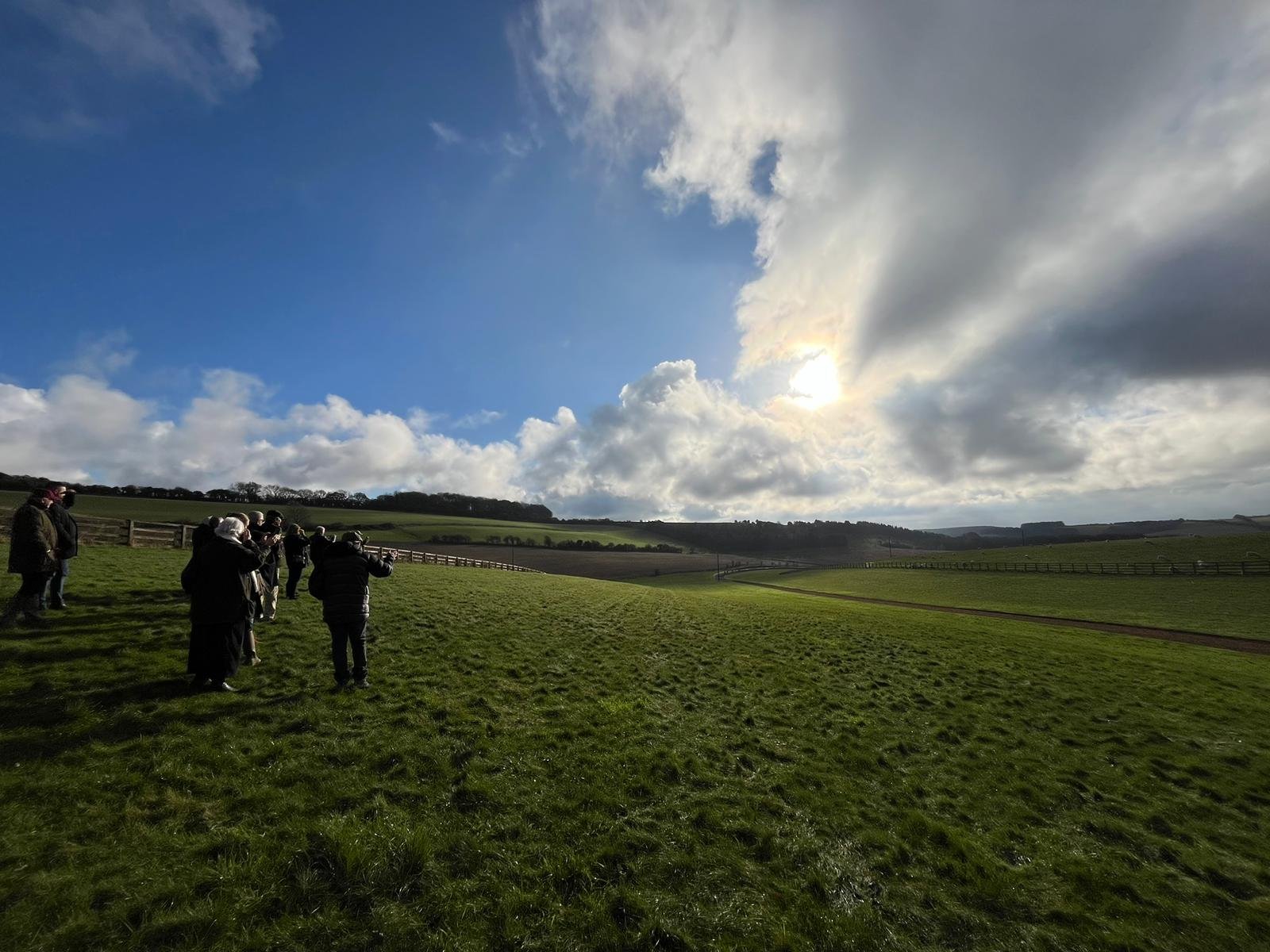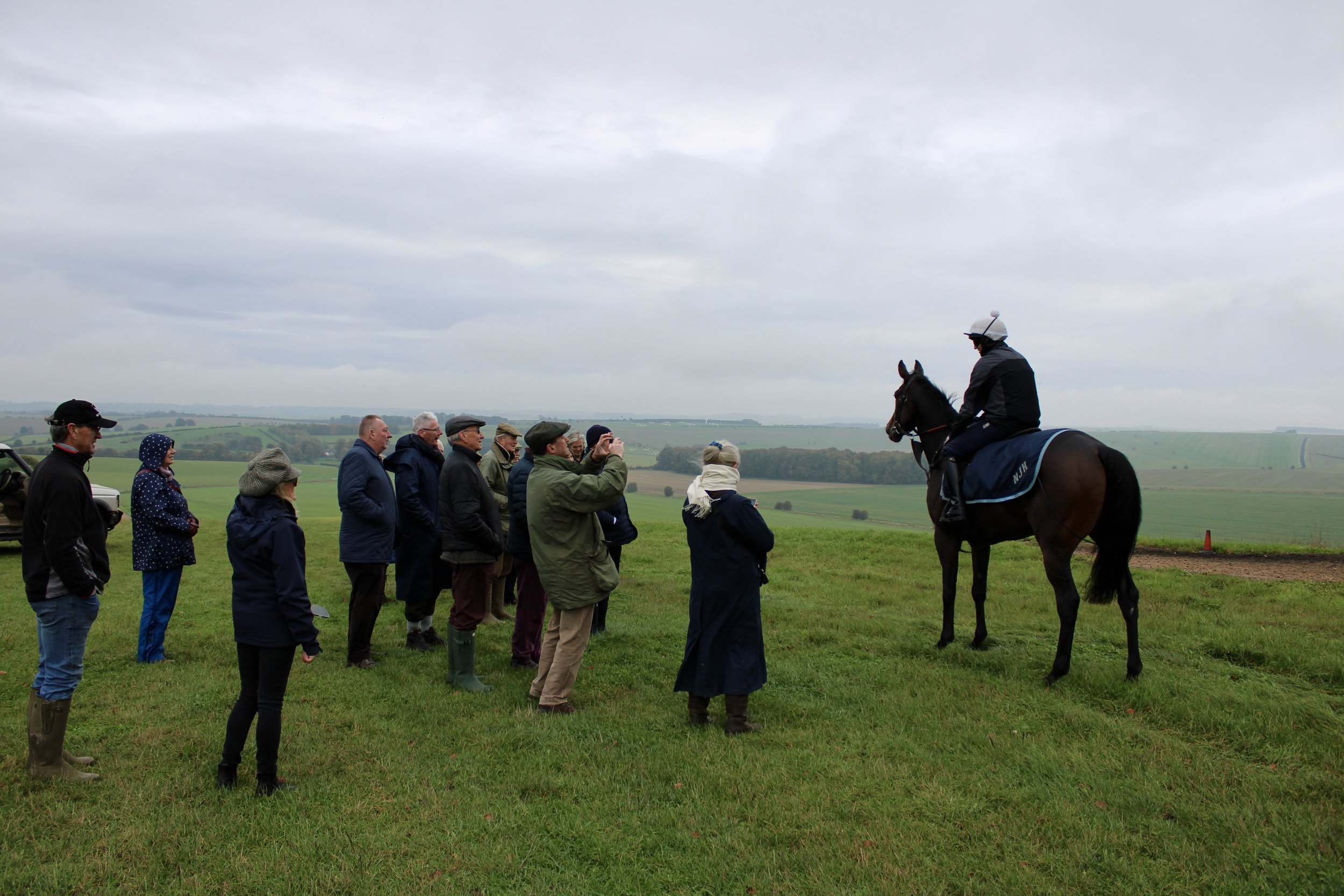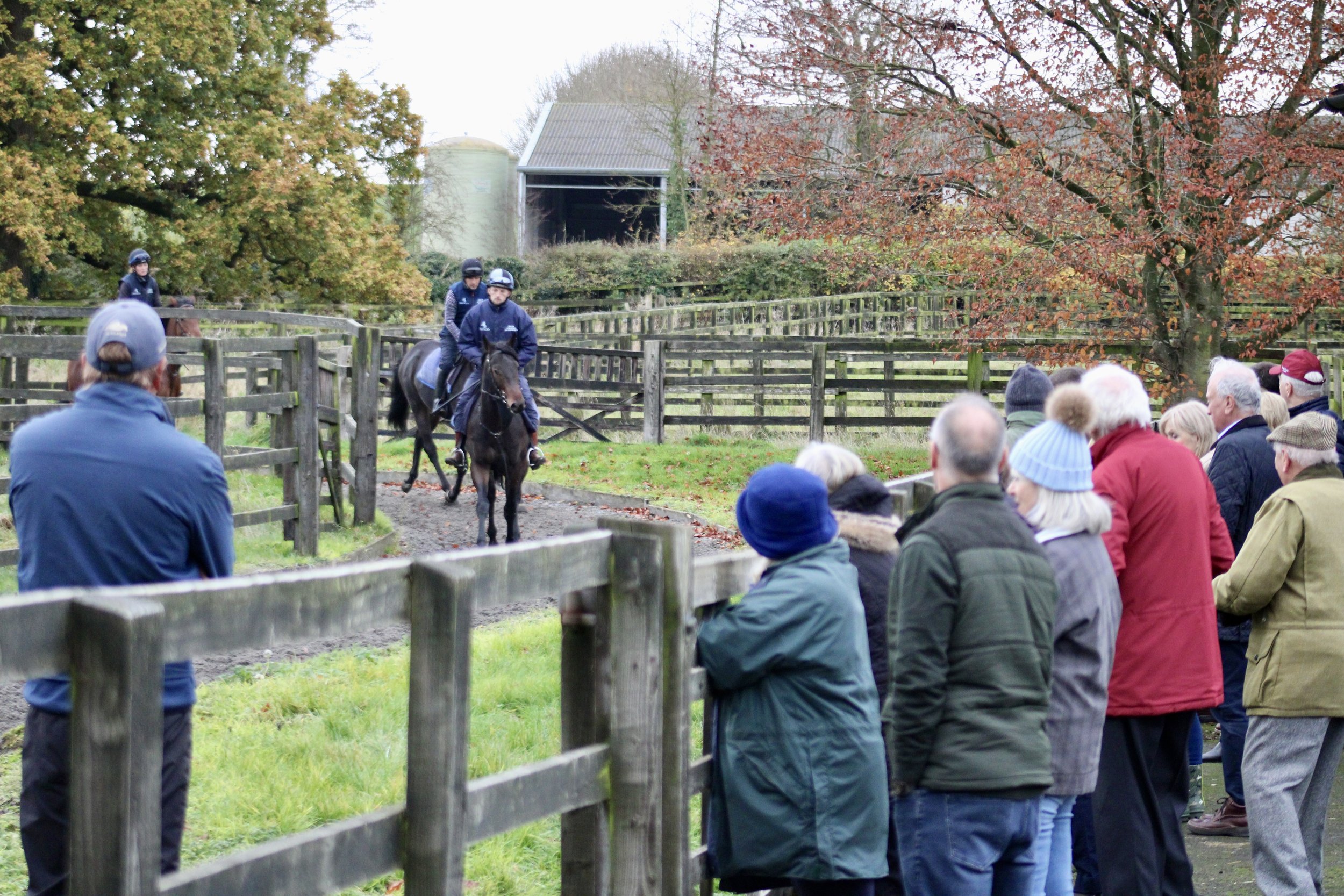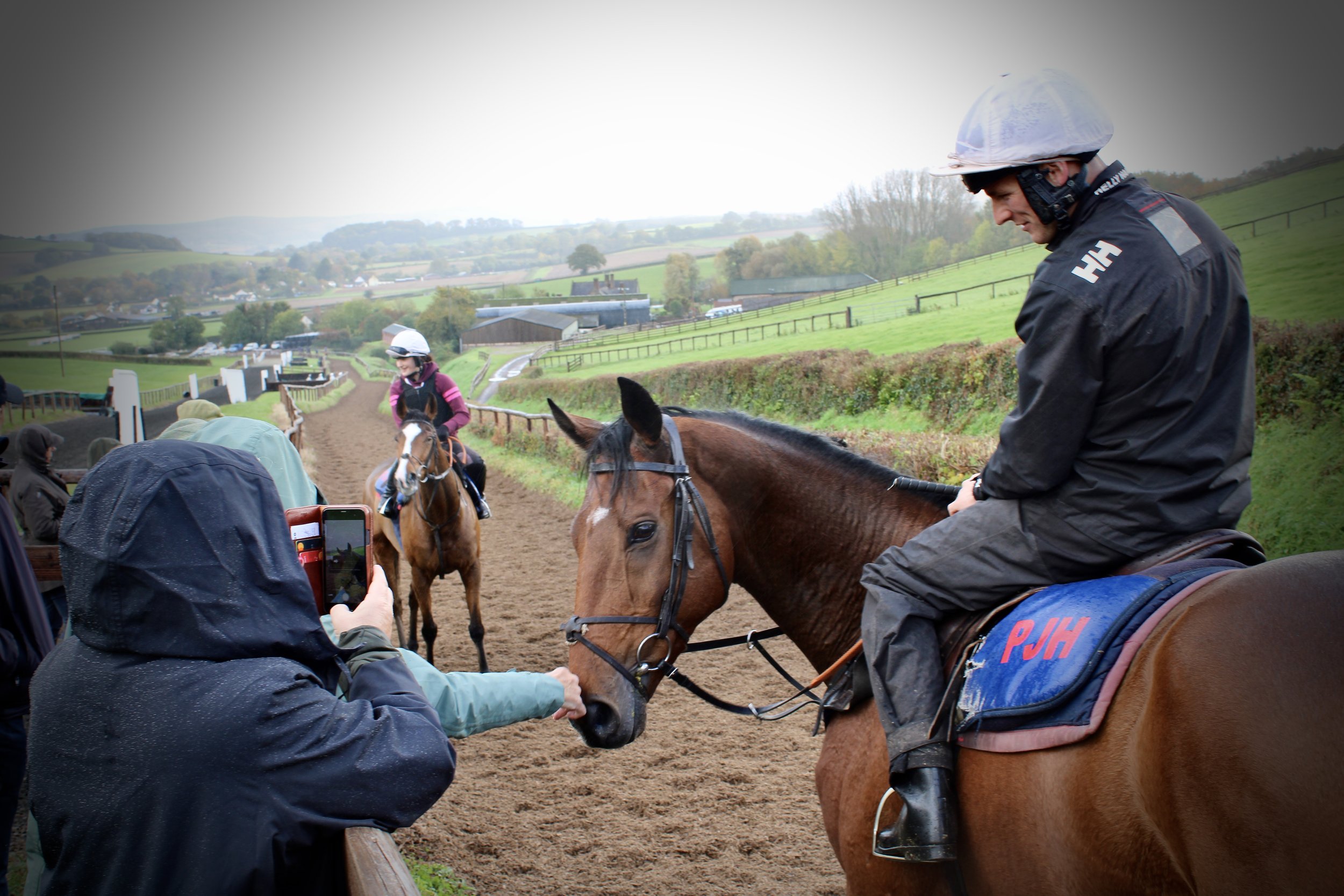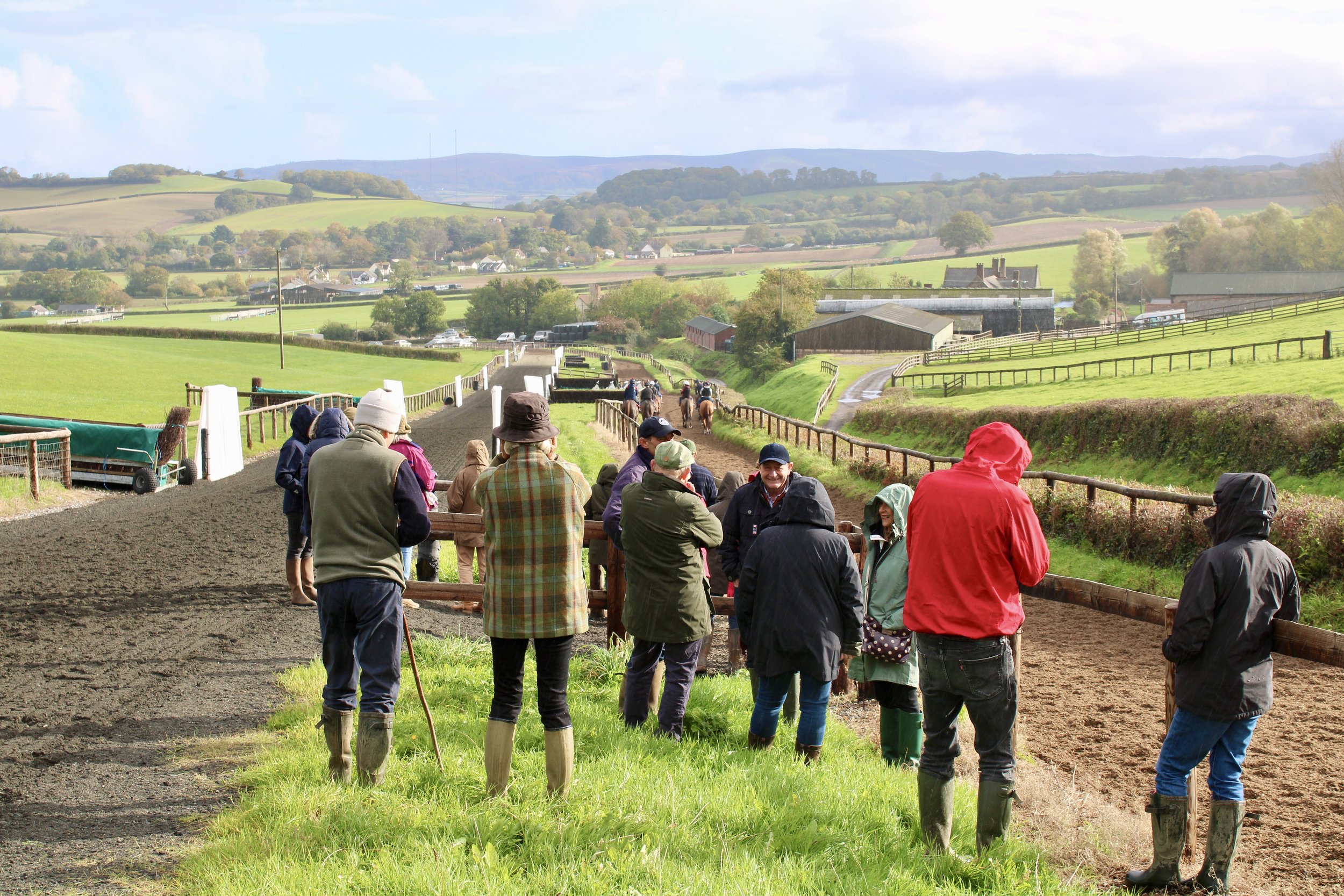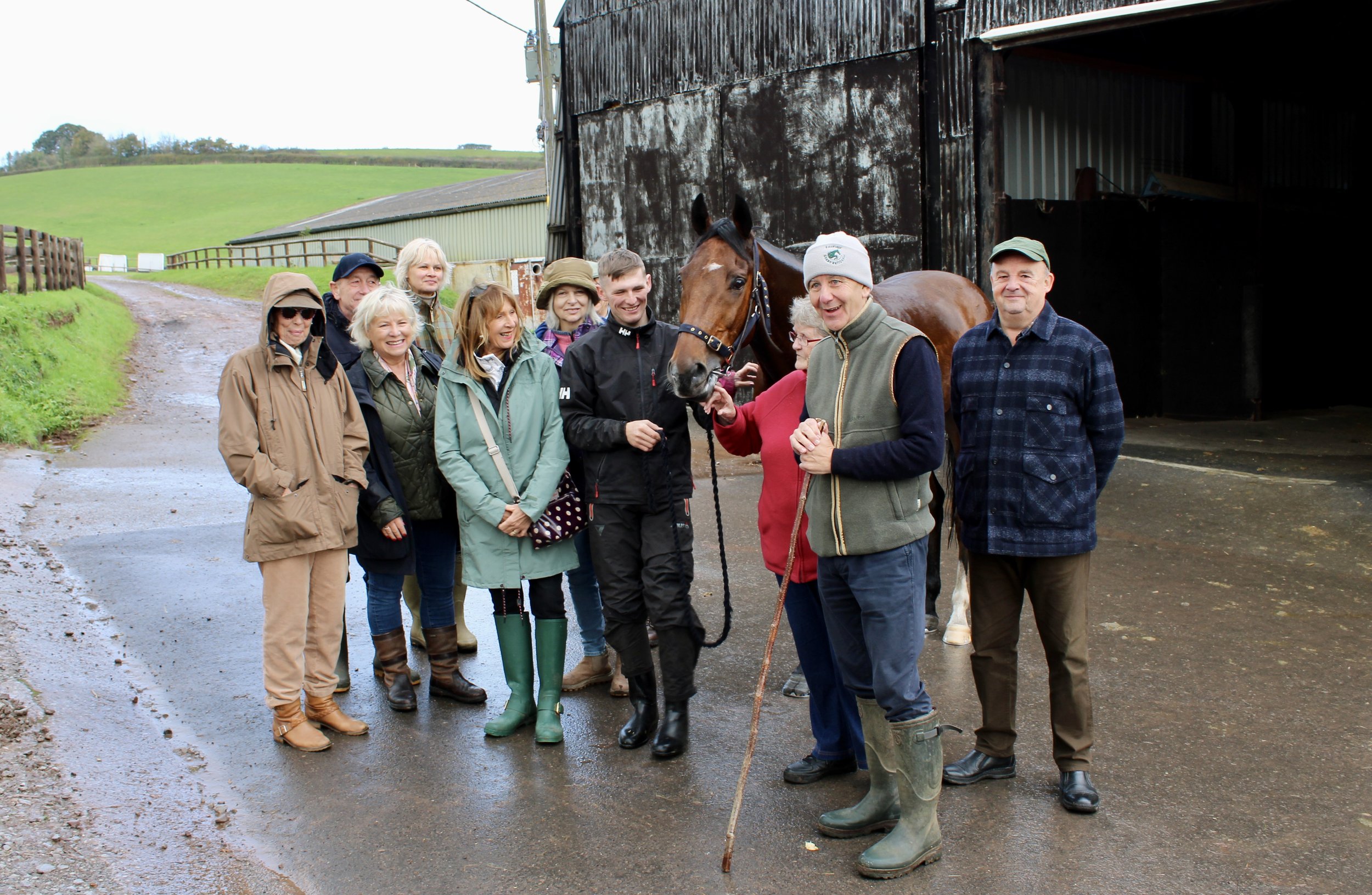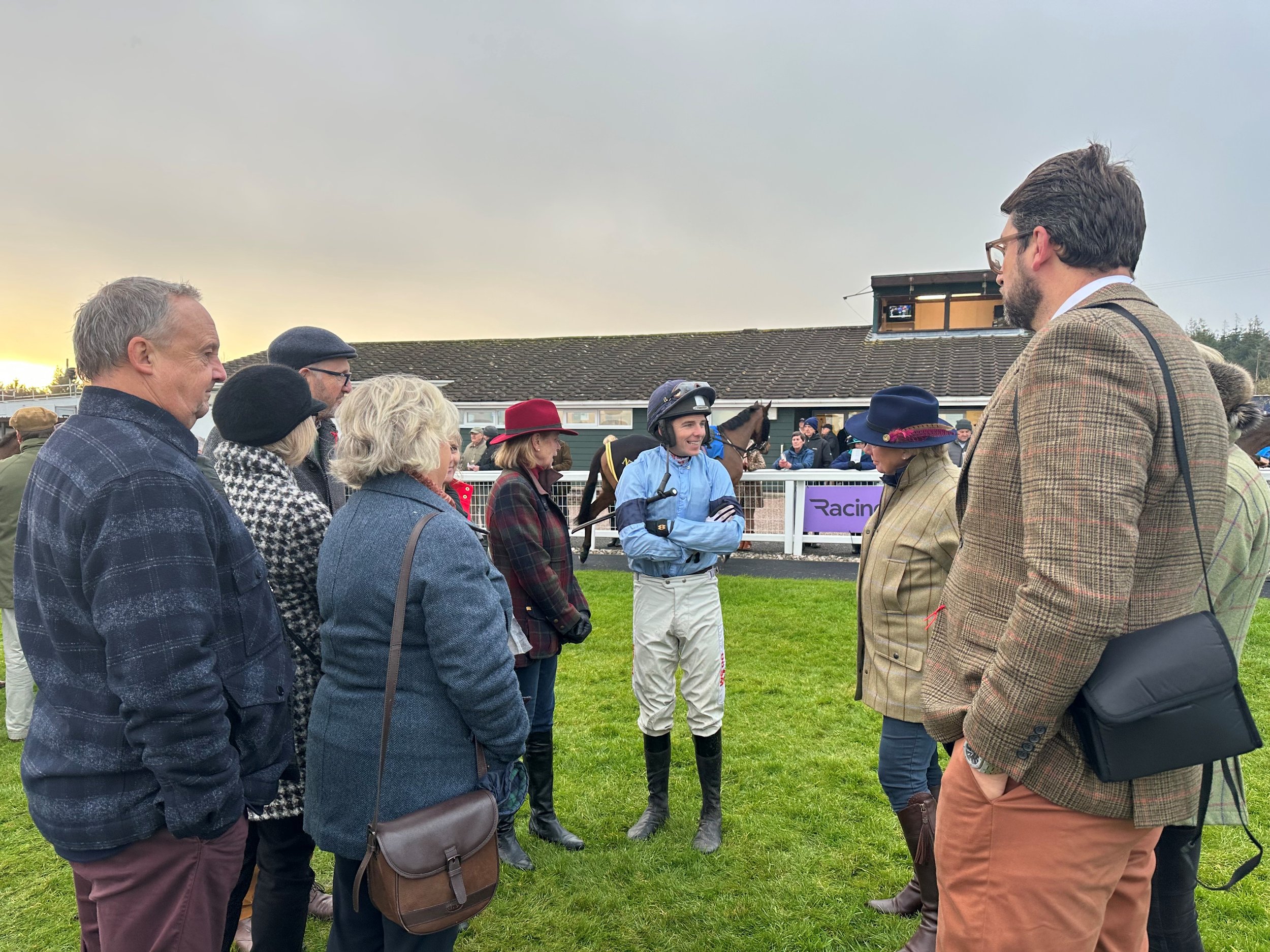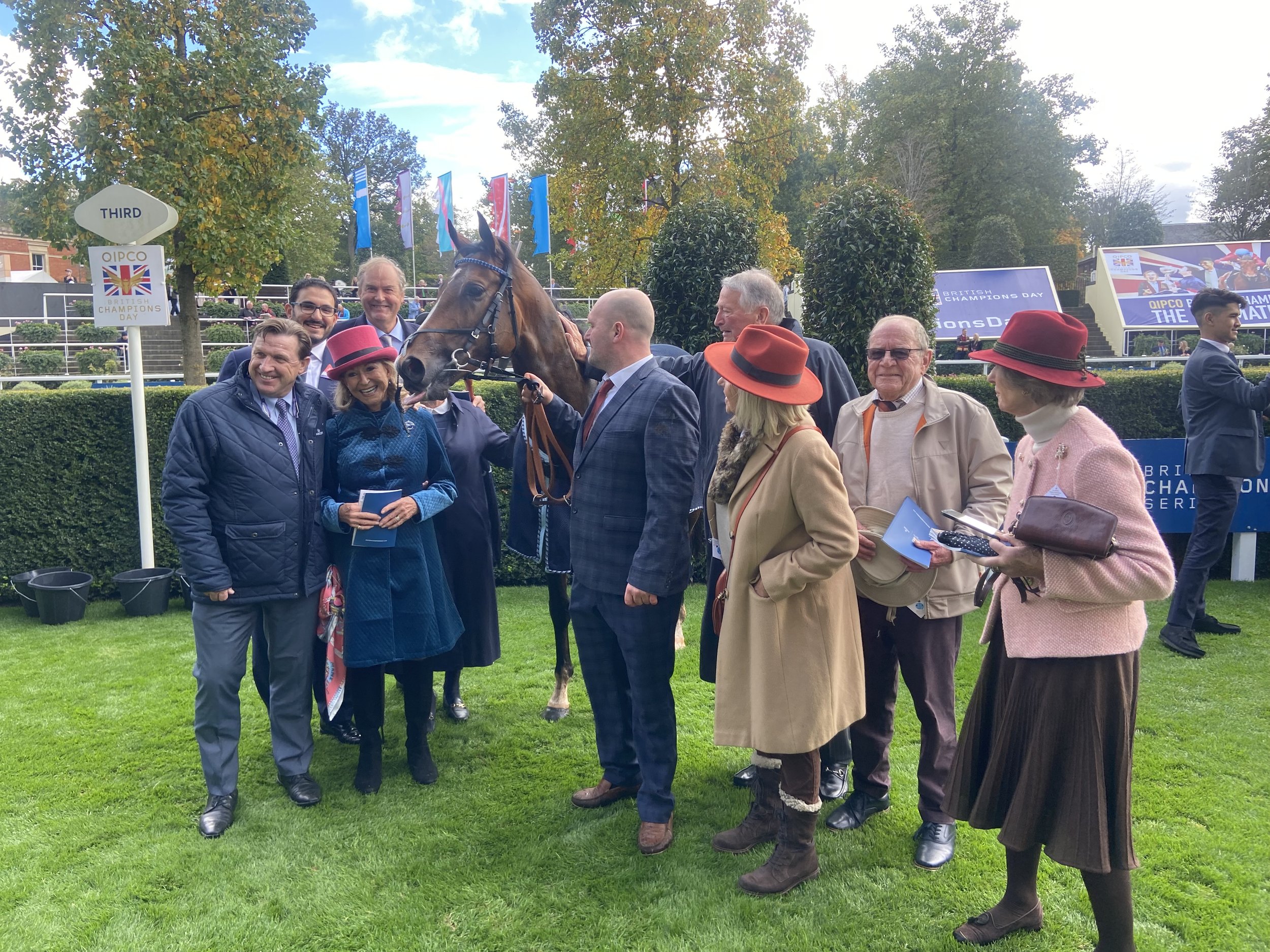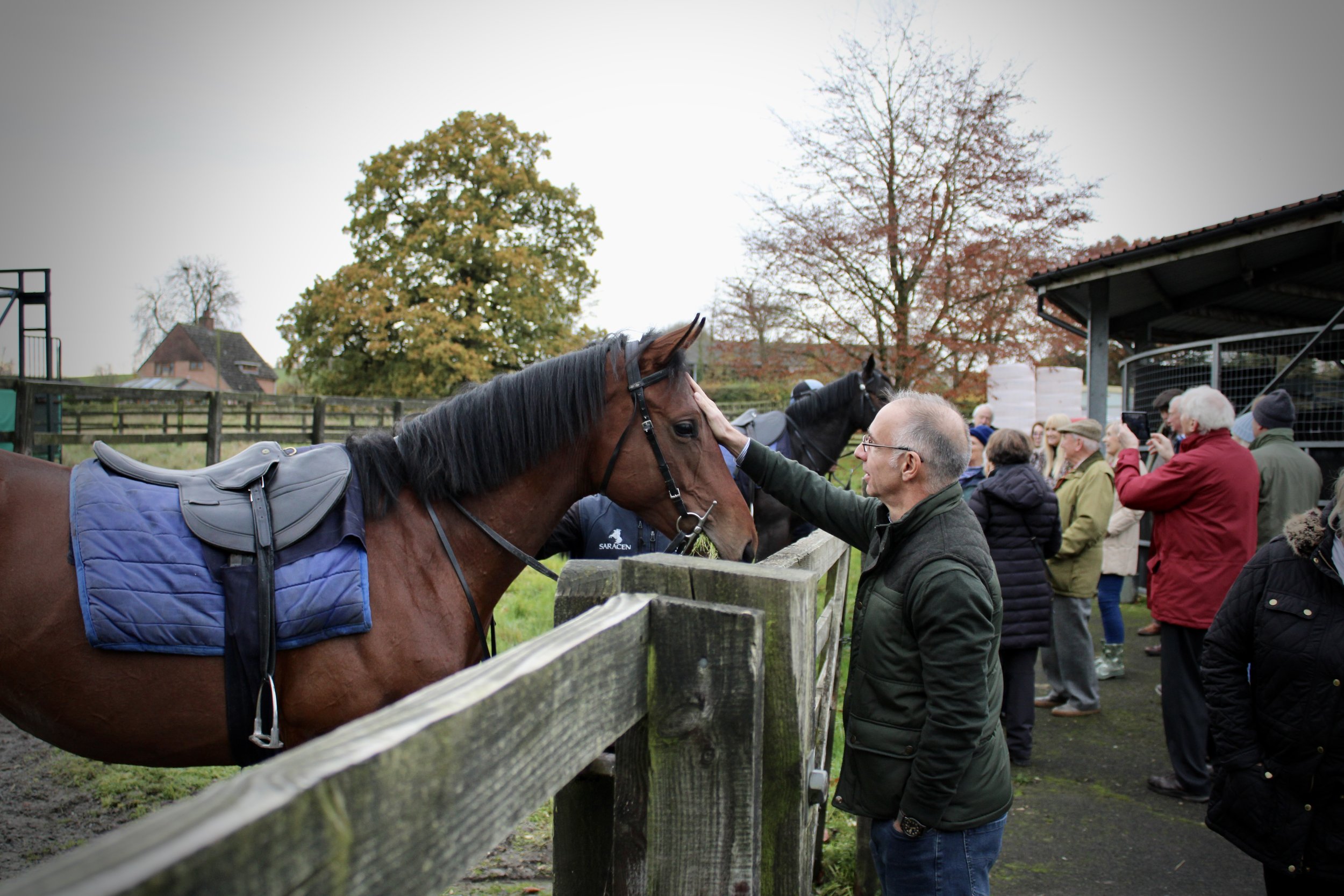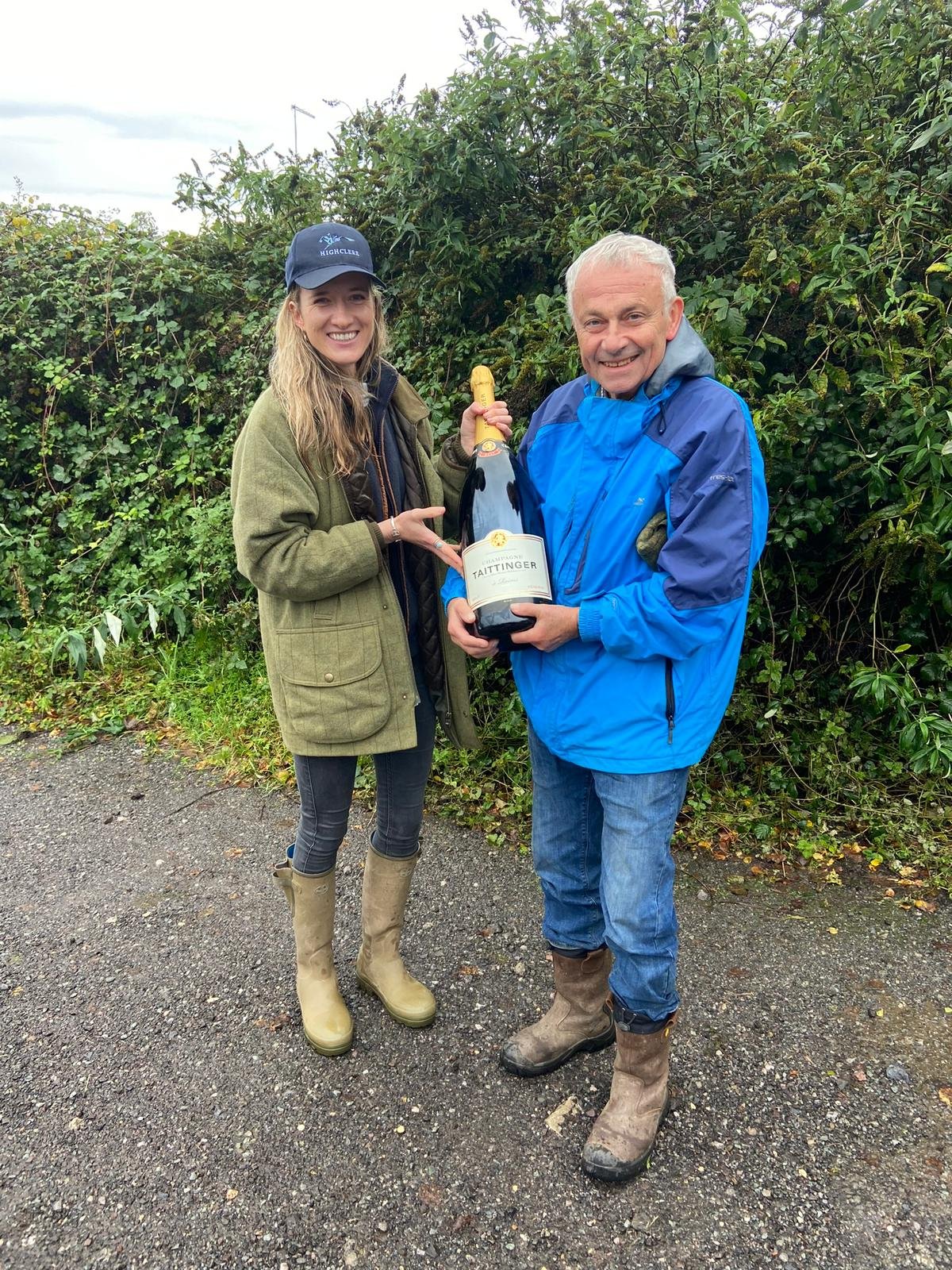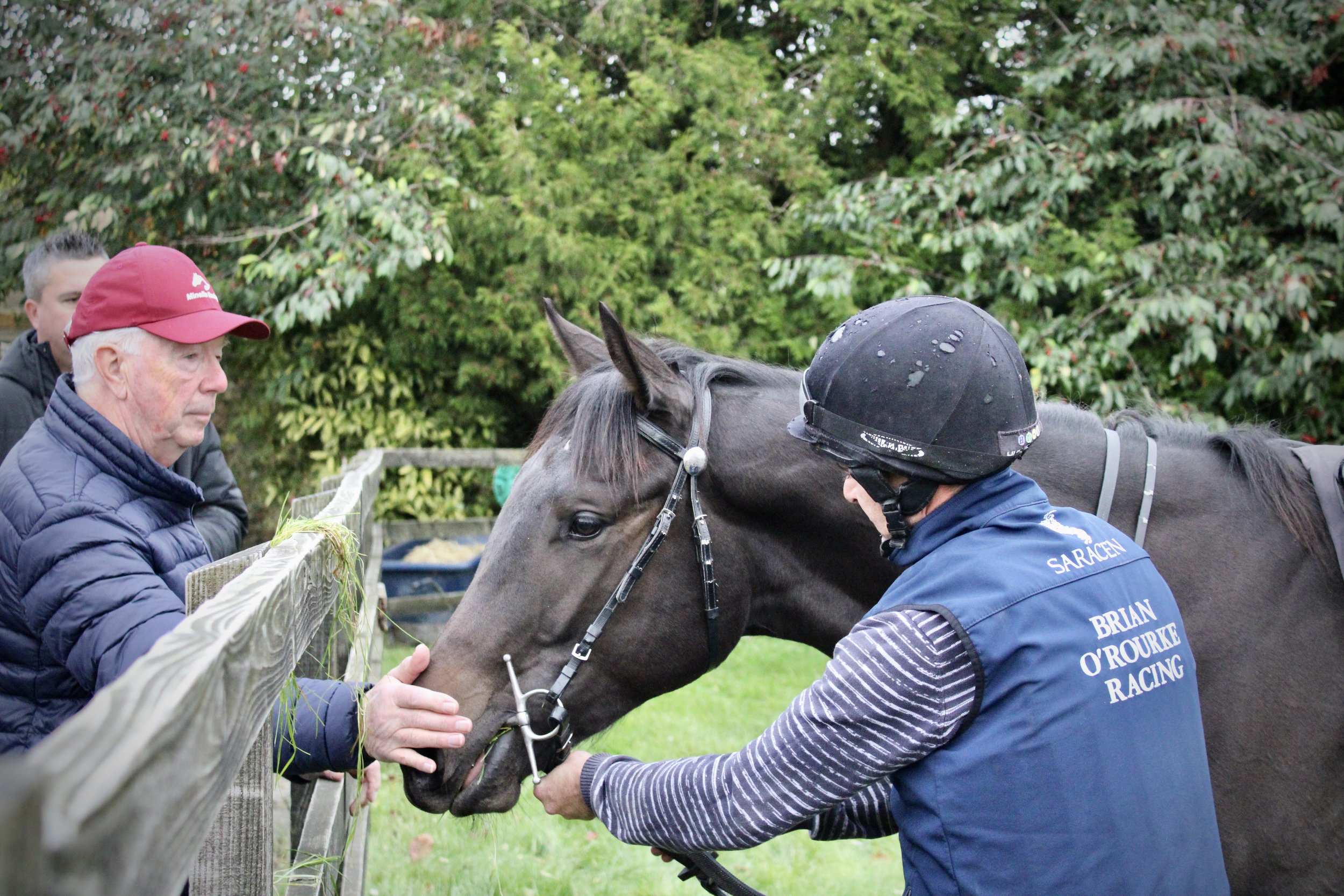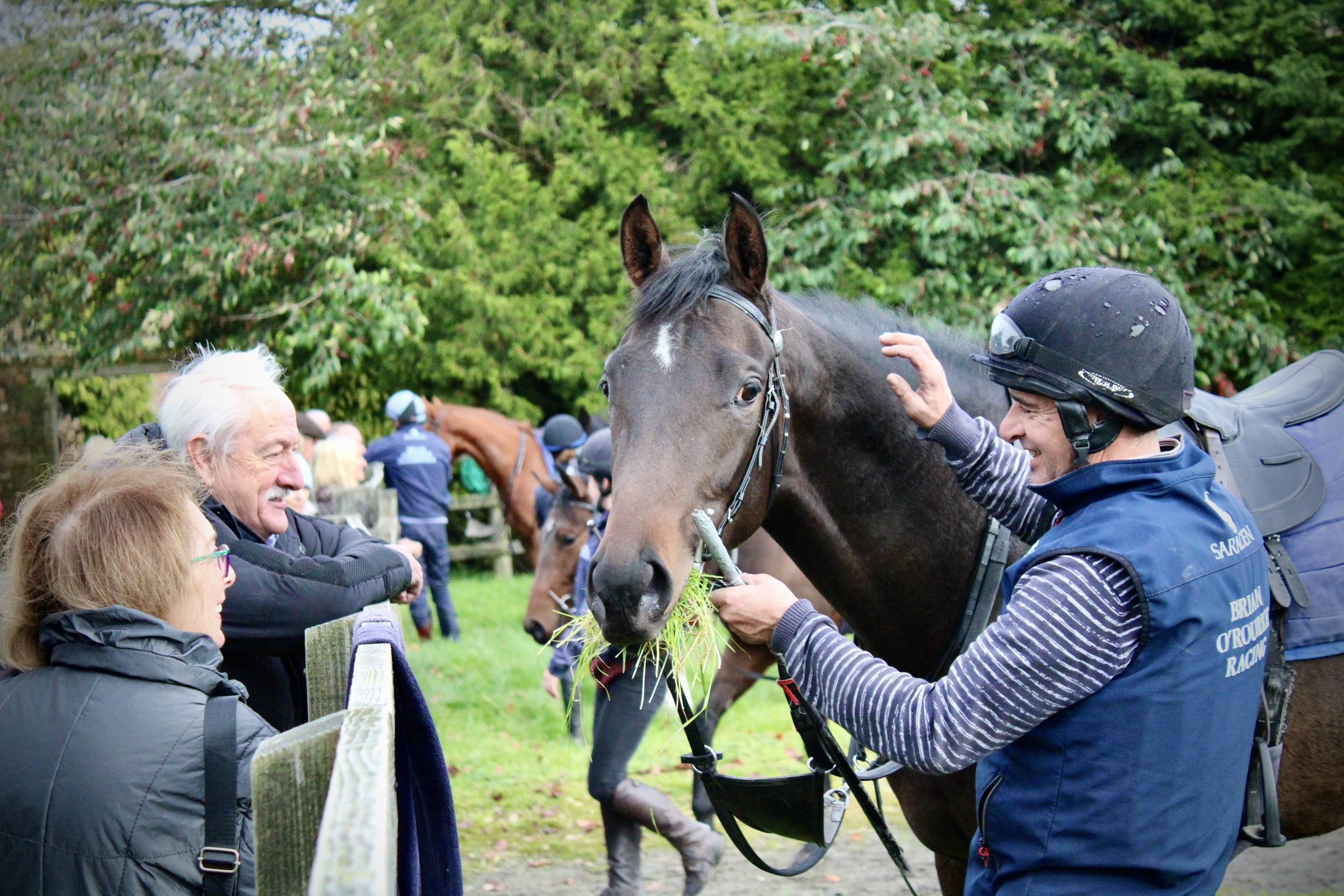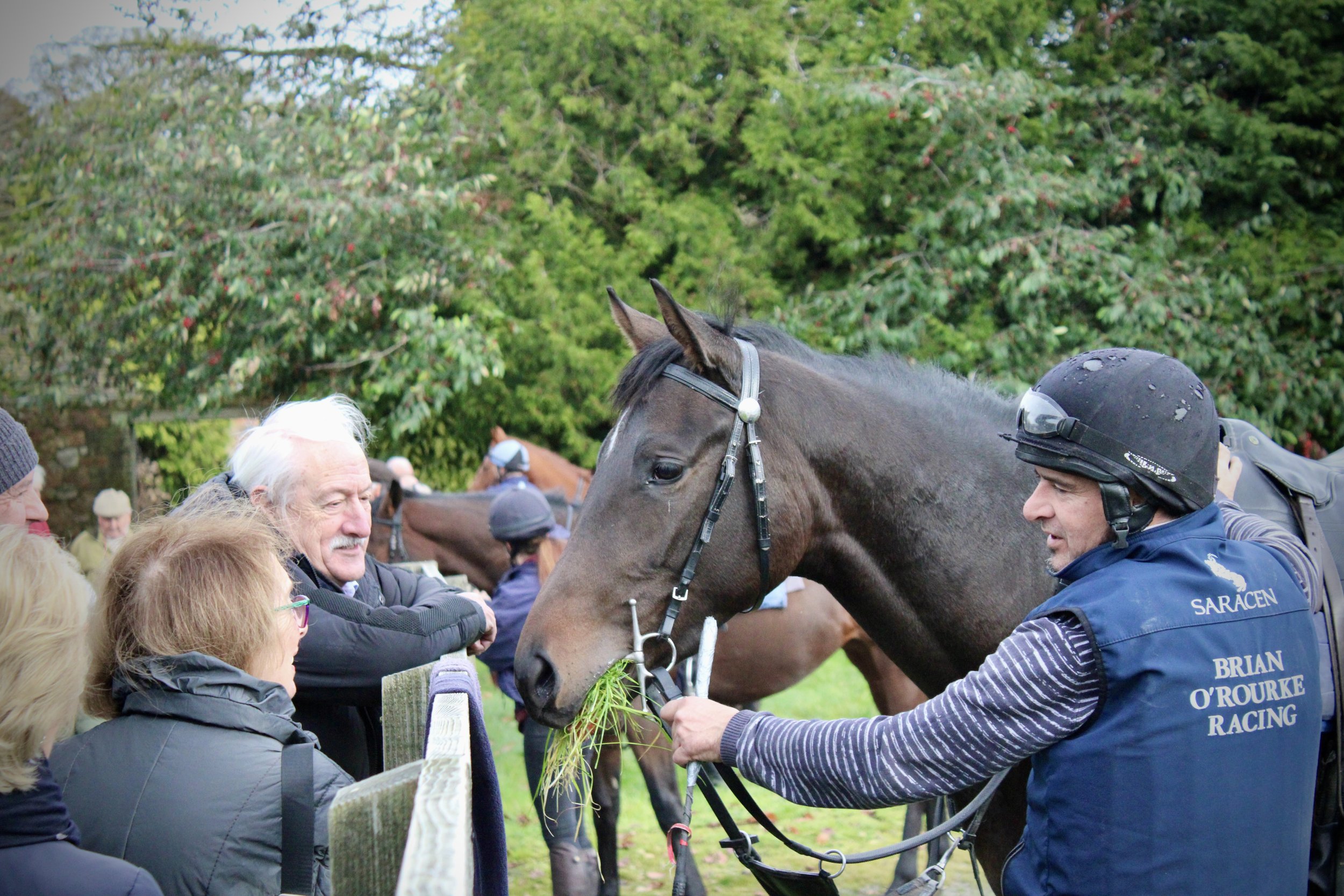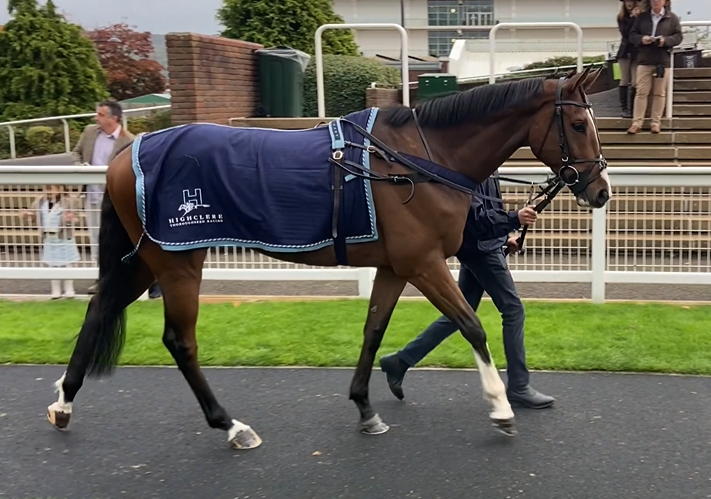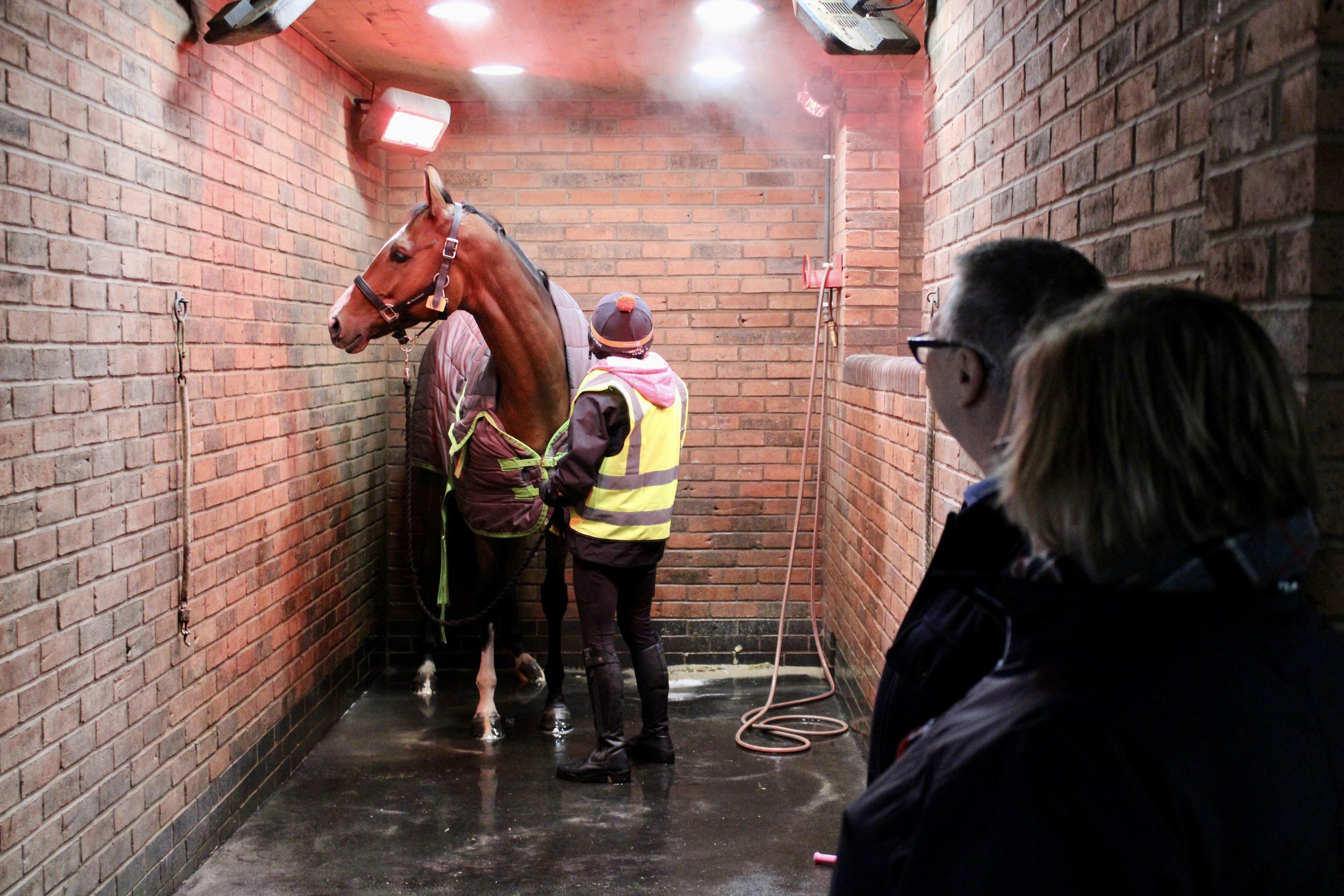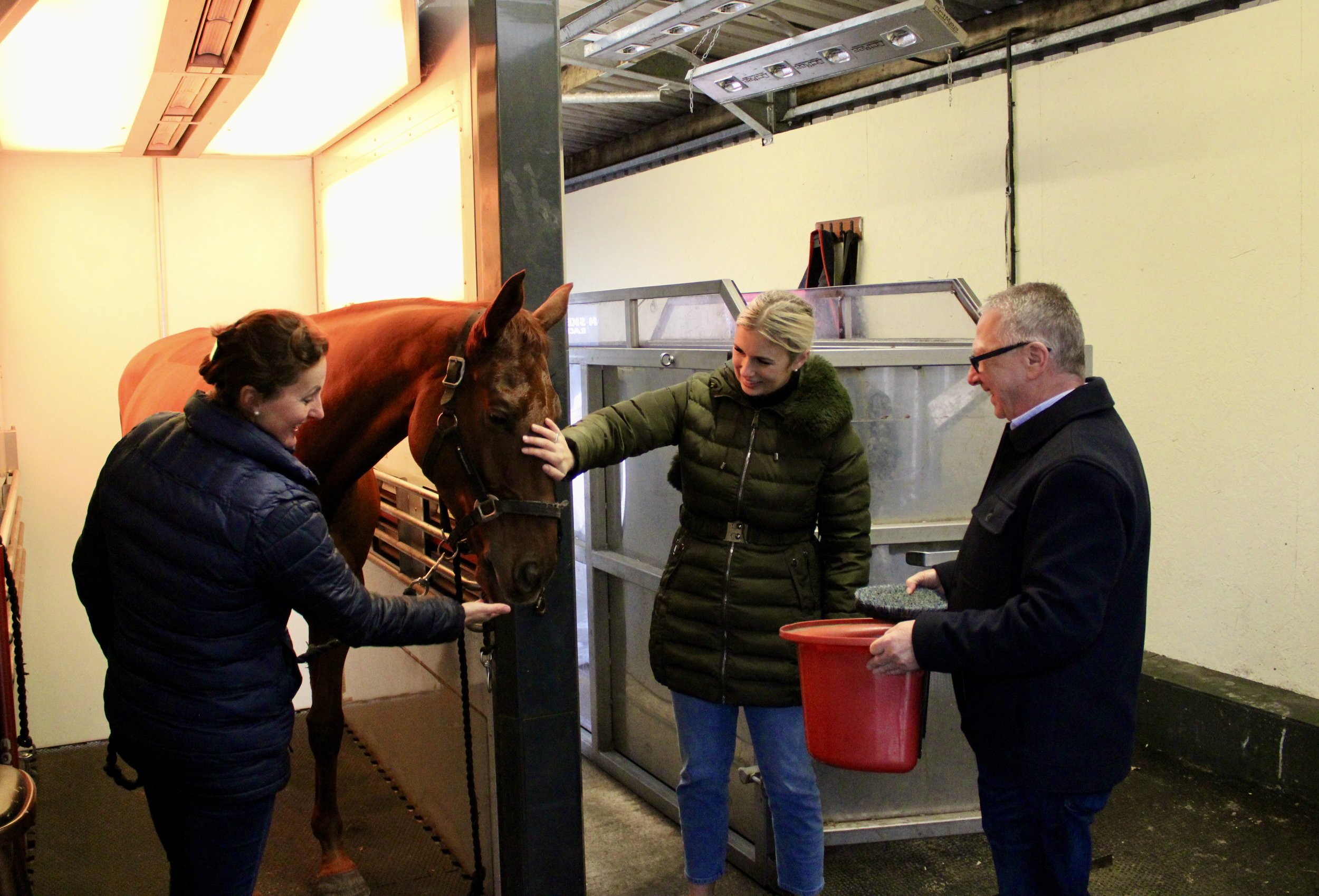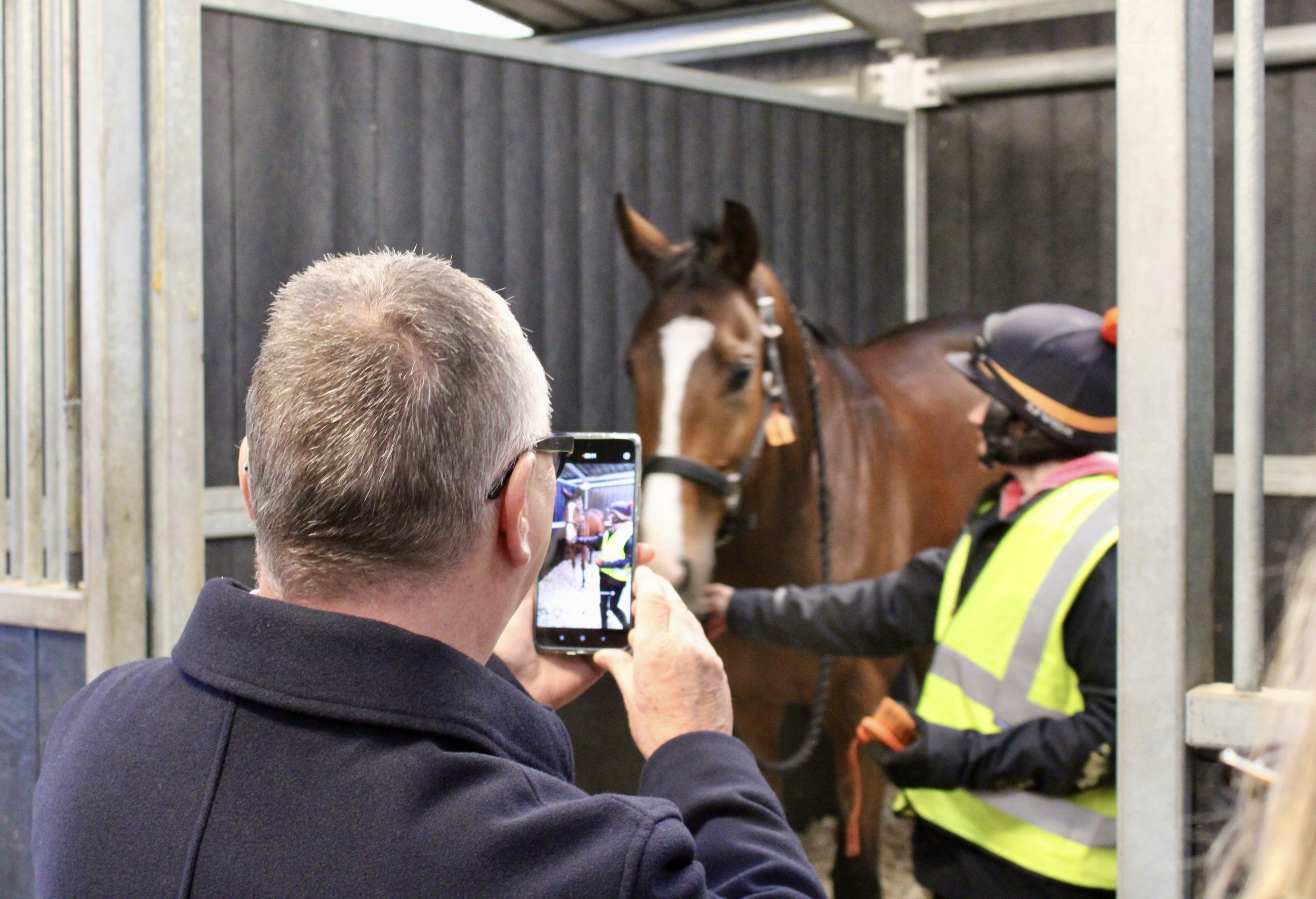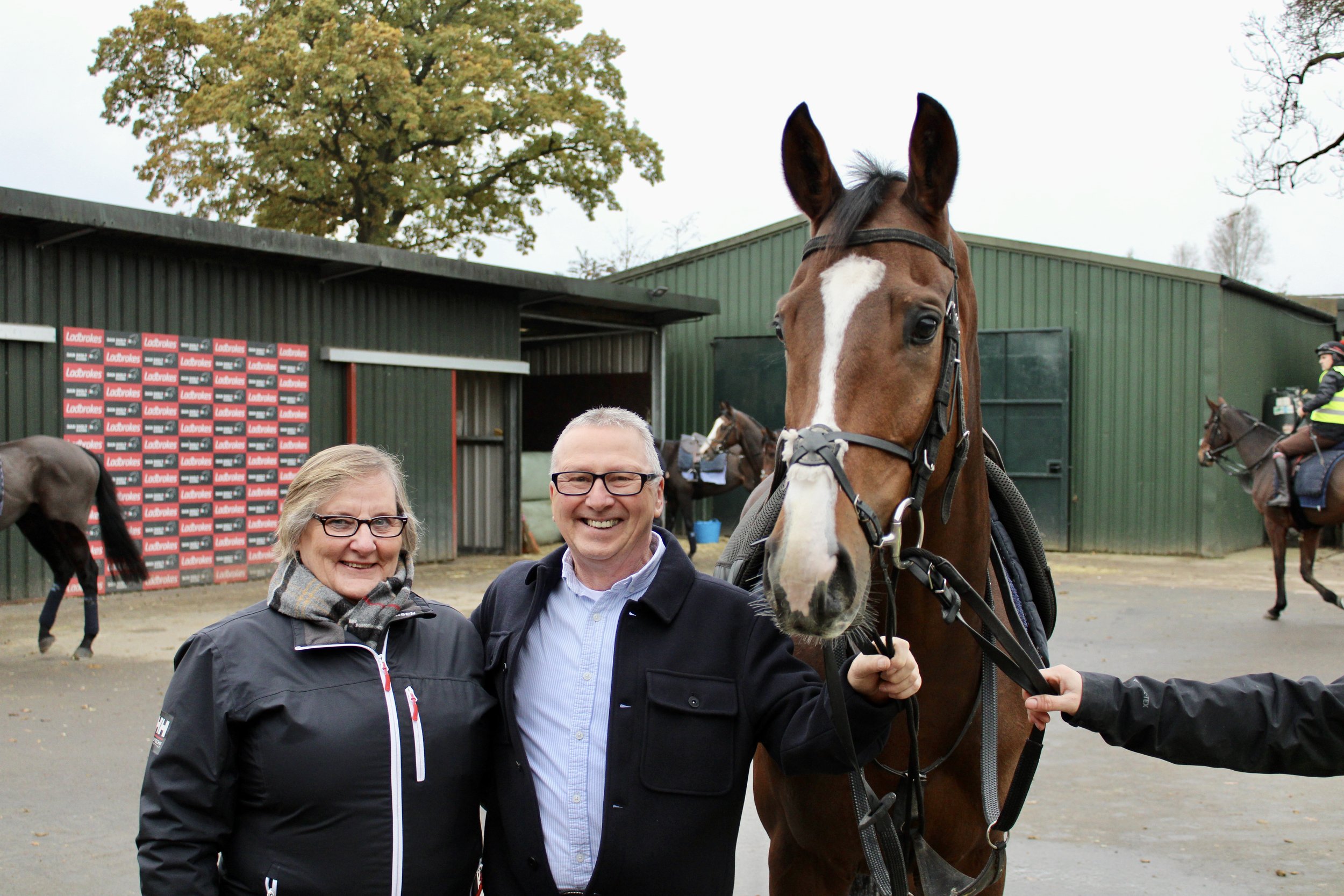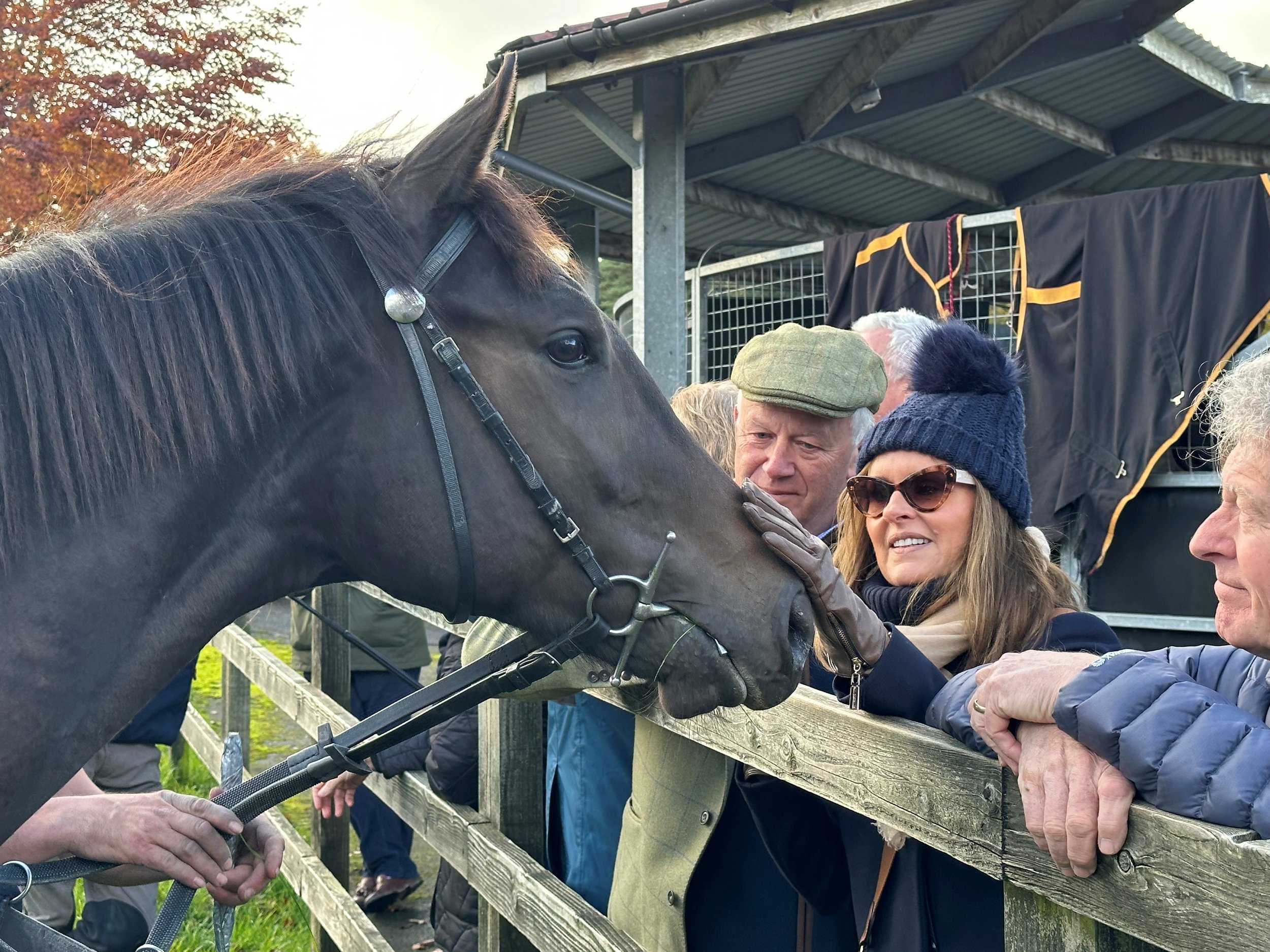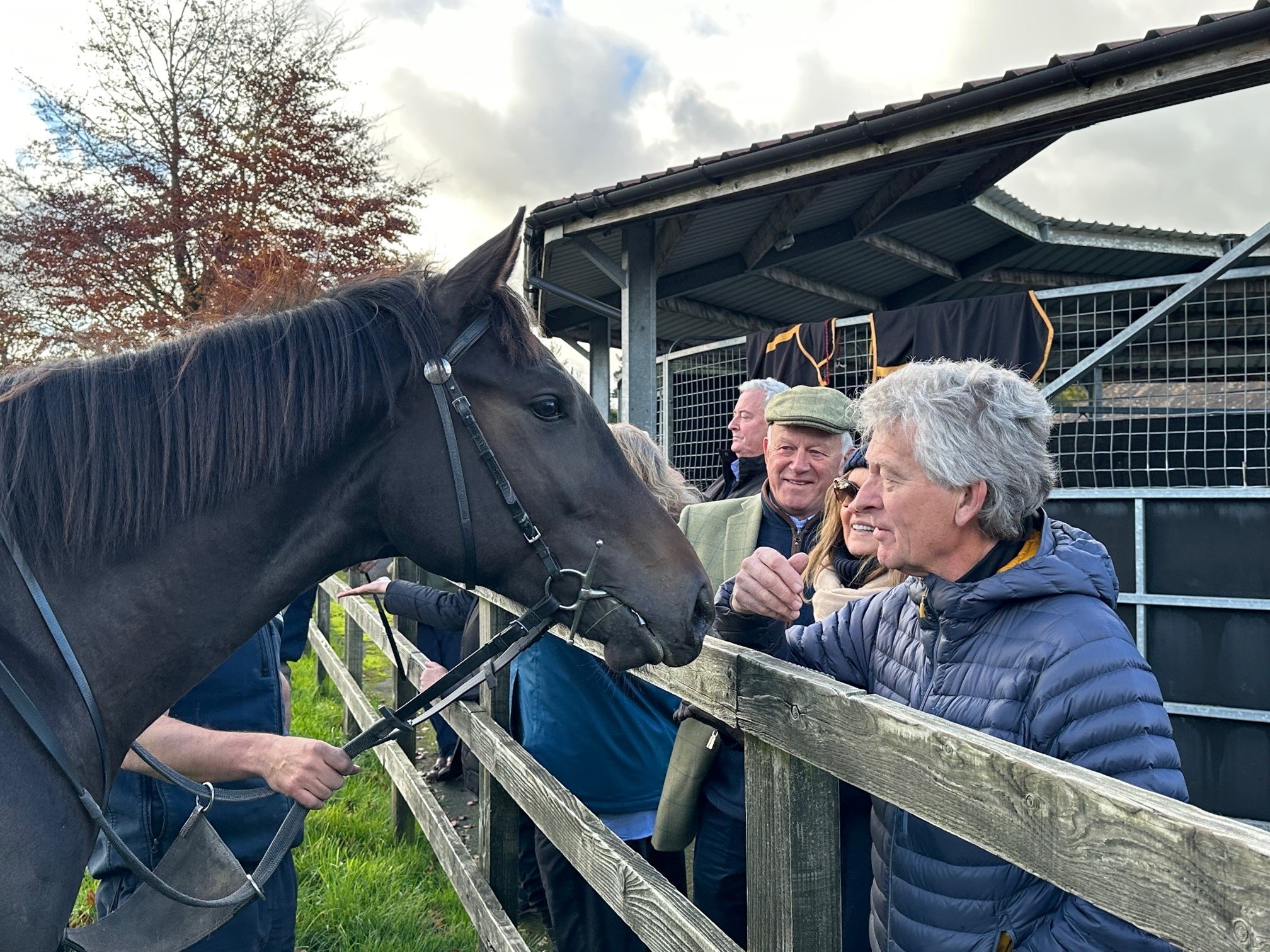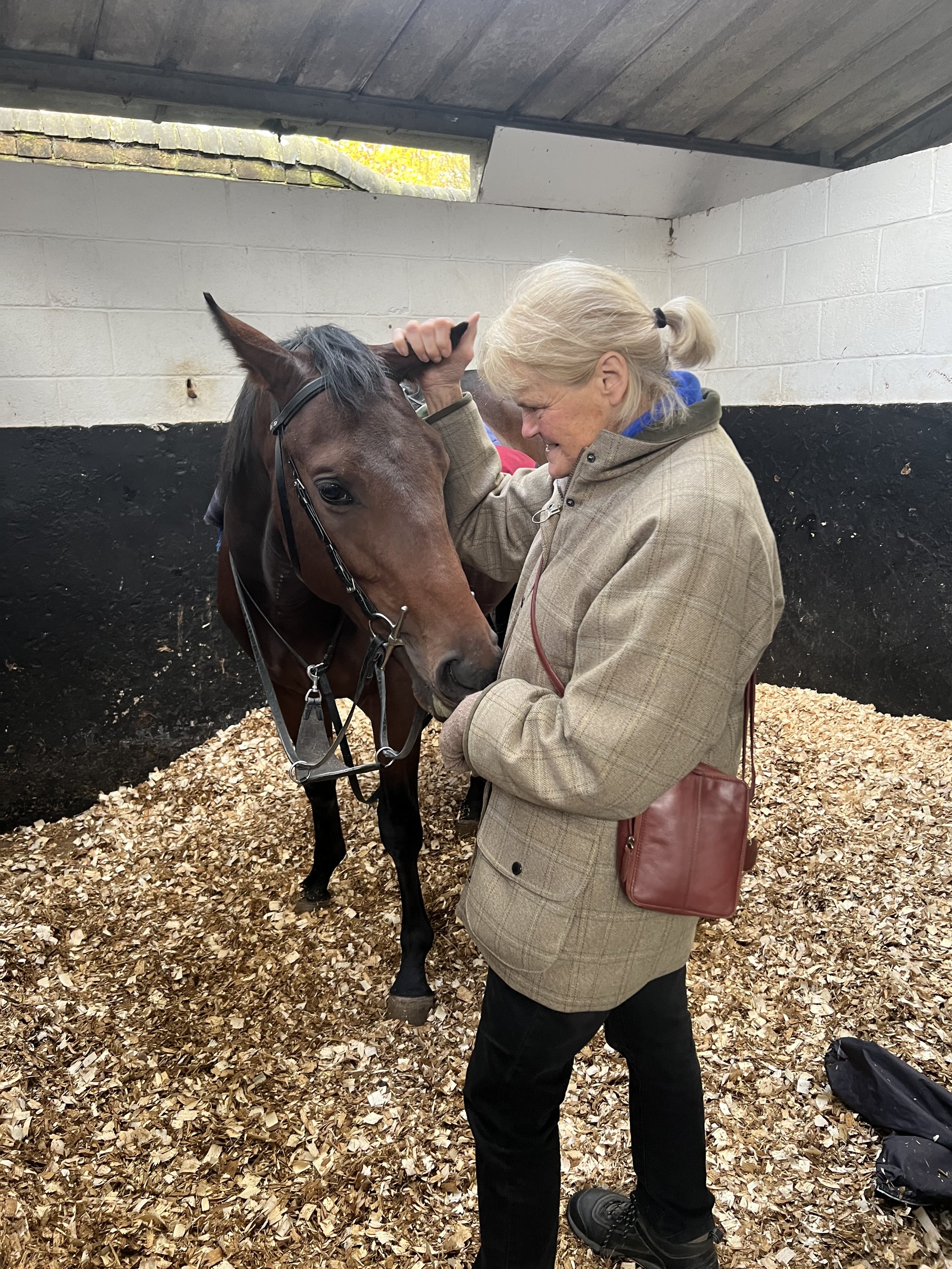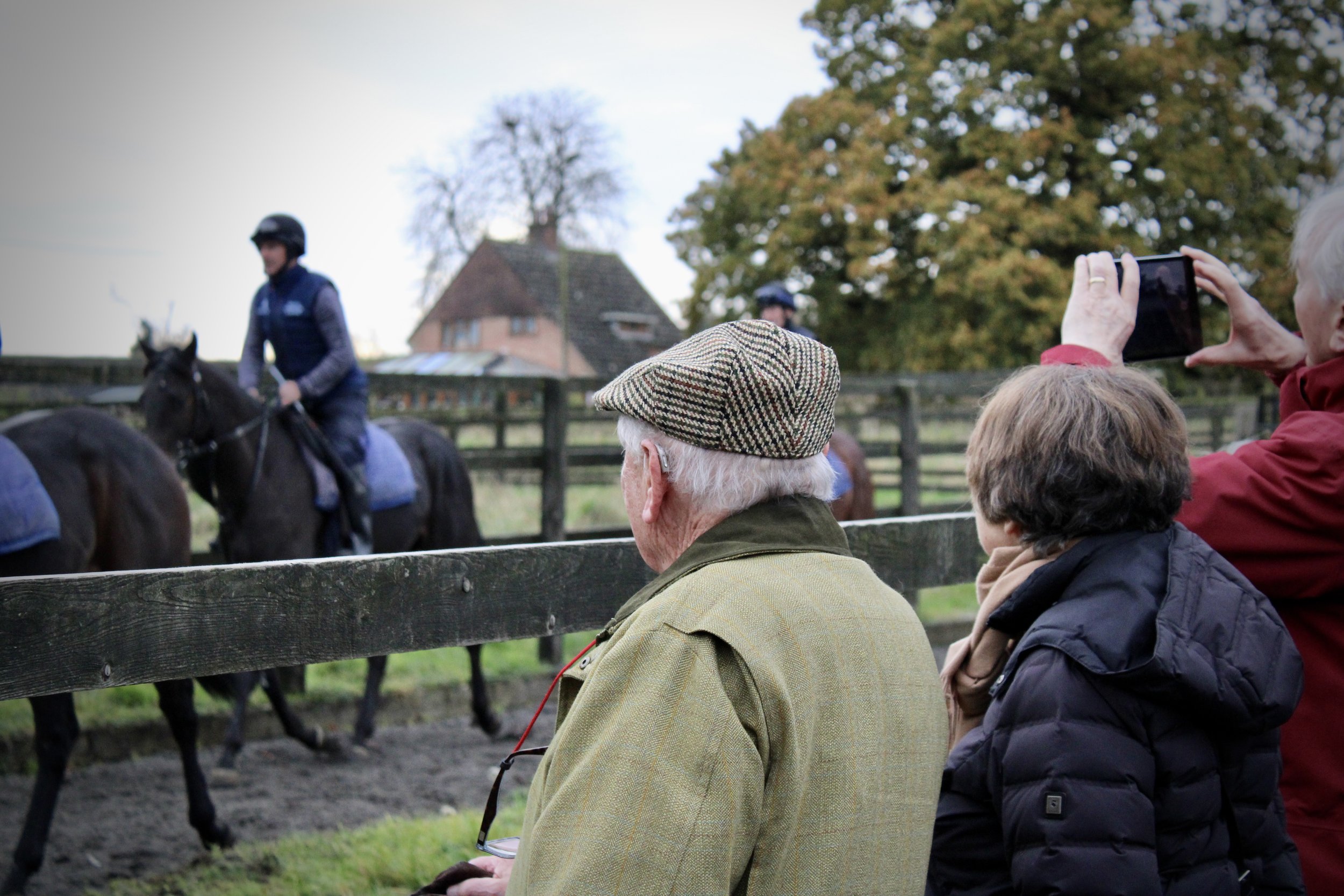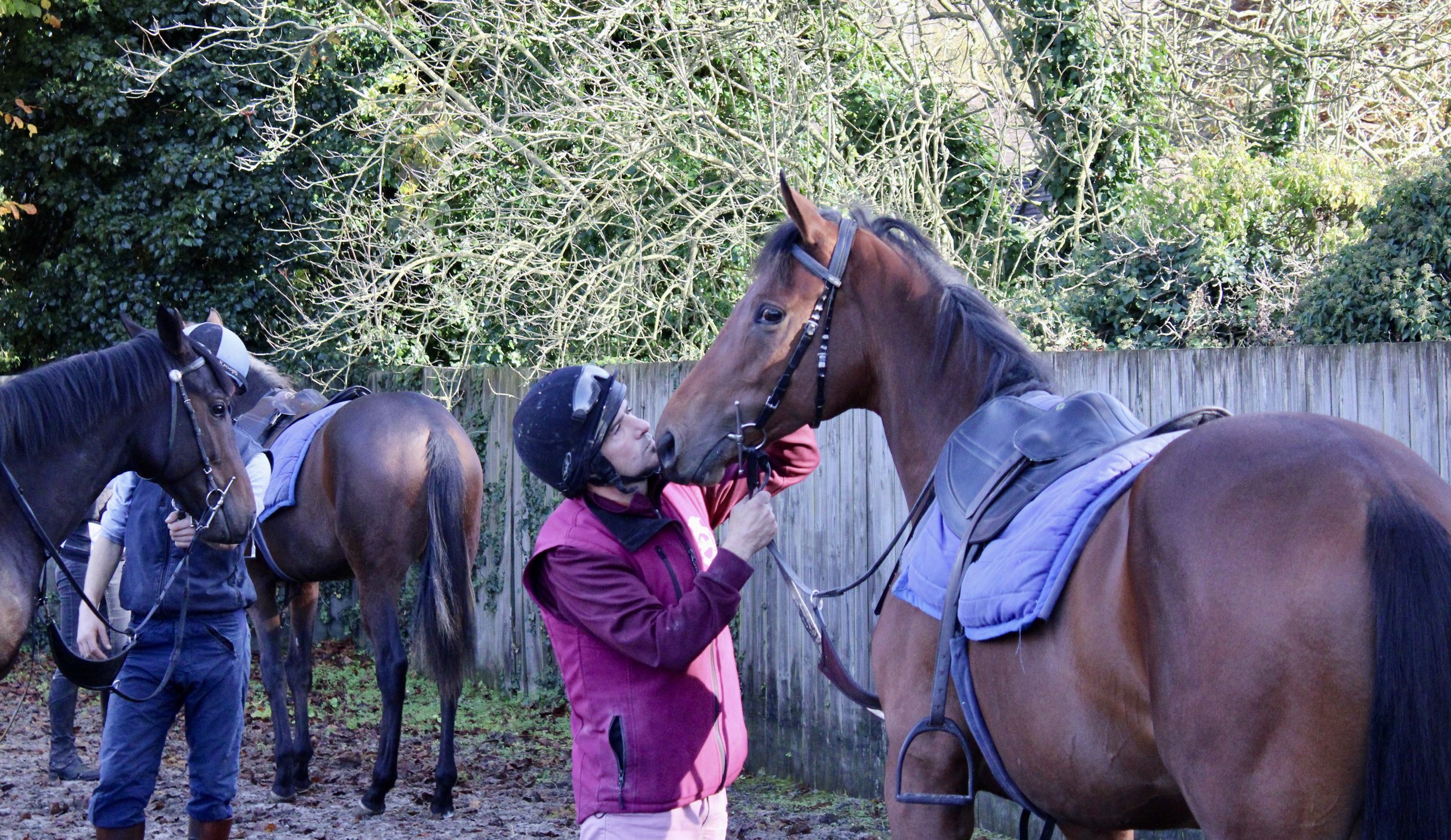NOVEMBER 2023
Owners go behind the scenes and meet their yearlings in action at the pre training yards (Blue Point filly pictured)
By Harry Herbert
The Cachet story for Highclere and her owners will draw to a close next Tuesday as she becomes the first 1,000 Guineas winner since 1988 to be offered at the Tattersalls December Mare sale. She is one of a very select group of fillies and mares on offer in the Sceptre session of the sale and we will all be holding our breaths as she enters that famous ring. Of course the market will decree what she is worth but suffice to say that it will be many times her purchase price of 60,000 guineas that Jake Warren paid for her in the same ring at the Breeze Up sale two years ago.
Cachet winning the 1000 Guineas 2022. She will be lot1799 offered on Tuesday 5th December in the evening Sceptre session of the December Mare Sales at Tattersalls.
Meanwhile two other well known Highclere horses sold for multiples of their purchase price at the Tattersalls horses in training sale. Royal Patronage made 300,000 gns and will continue his career in Australia with Gai Waterhouse. He cost 60,000 gns as did Atrium who sold for 160,000 gns.
The yearlings continue to please Brian O’Rourke and Malcolm Bastard and as you will see below we have had some really fun share owner visits to see this key part of their horse’s education. The dreams are very much alive watching these yearlings cantering away only a few weeks after parading them at Highclere Stud!
The National Hunt team are very much getting into their stride and what fun it was to see Mojo Ego storm to victory at Doncaster giving Harry Derham his first Highclere winner. I have no doubt that this will be the first of many! There is so much to look forward to and if you are still looking to get involved in the jumps of flat then don’t hesitate to call me or my team as limited shares are available in some really important horses under both codes.
Racing’s petition on affordability checks. Sign the petition.
On another matter I was delighted to see that Racing’s petition on affordability checks passed the 100,000 mark a remarkable achievement that took less than a month to get to this figure. I have attached here a link to that petition in case you hadn’t had a chance to sign for this all important cause. BHA chief executive Julie Harrington said: "It's been fantastic to see the whole racing industry get behind the petition. The fact that we hit more than 100,000 signatures in a few weeks is a clear demonstration of the depth of opposition felt by punters across Britain to the proposed financial risk/affordability checks.
"These checks will have an impact on so many people who bet safely on horseracing, so it is vital that the issue is debated and properly scrutinised by MPs. It is also important that the government recognises the voices of more than 100,000 racing fans and bettors and looks again at the potential impacts of its proposed policy."
With my best wishes,
Harry Herbert, Chairman
On The Track
By Emily Scott
Since our last edition of ‘On The Track’ we have transitioned from the Flat into the National Hunt season. We signed off our turf season in style at Ascot with Spycatcher getting up for third in the Champions Sprint (Gr 1), which took his annual earnings over £200,000. It is remarkable what a come back this gelding has made, after we nearly retired him in July 2022, he was nursed back to full fitness under the watchful eye of vet Duncan Moir. This year he has won two races and finished in the first four on all seven starts, including two Group 1 placed efforts. He was denied victory in the Prix Maurice de Gheest (Gr 1) by a short head, so the aim next year will be to win a big one!
Spycatcher taking third spot in the Champions Sprint (Gr1) at Ascot
Believing at QIPCO Champions Day in the parade ring for the Champtions Sprint (Gr1)
Earlier the same month Atrium produced a career best performance to win the £180,000 Howden Challenge Cup (Heritage Handicap) at Ascot. This was his seventh win in the Highclere silks and after a bit of an up and down season his trainer, Charlie Fellowes, remained confident that he “had a big one in him”, so we kept aiming high and that perseverance was rewarded in spades. Atrium was presented at the Tattersalls October Horses In Training Sale two weeks later looking fantastic and he was purchased by Najd Stud in Saudi Arabia for 160,000gns. This was a great result for his syndicate who had invested in him as a yearling for 60,000gns. We wish him all the best of luck for his new connections.
Atrium landing the Howden Challenge Cup (Heritage Handicap) at Ascot in October
Owners collecting the winning prize at Ascot for Atrium’s victory in the Howden Challenge Cup (Heritage Handicap)
Indemnity showed himself to be a horse to look forward to next season with another two placed efforts since our last update. He was second to smart looking horse, Cracksking, at Newcastle in mid-October and then was unlucky to be beaten when looking the winner for a long way at Lingfield last time. He hit the front with a good furlong to run and idled slightly, handing victory to debutant Popcorn Magic. Poor chap has since been gelded, which will no doubt focus his mind and I think he will be a lovely prospect for his patient owners as a four gelding in 2024.
On the jumps side of things, we have had a promising start to the season with Valgrand bursting onto the scene in the bumper at Cheltenham’s opening meeting. Dan Skelton was confident going into the race that he would run with promise, but I think it took us all by surprise how he swept by the entire field, bar the winner, to finish second. He had travelled in rear for much of the race and was kept wide by Harry Skelton in search of better ground. It was pleasing to see how he handled Cheltenham’s undulations and in particular, how he motored up the hill inside the final half mile. He has schooled at home and jumps like a buck, but that performance at Cheltenham has got Dan excited to target some nice bumpers for the rest of the season and we can look forward to him as a novice hurdler next year.
2nd placed Valgrand and some thrilled owners at Cheltenham in the Open National Hunt bumper on the 28th October
Valgrand pre parade Cheltenham 28.10.23
Harry Derham has made an incredibly strong start to the 2023/24 season and is currently operating at a 30% strike rate. Mojo Ego, who made his debut for Highclere at Kempton in October, needed his first run but he took a big step forward on his second start to win a smart looking juvenile maiden hurdle at Doncaster. He was sent off second favourite of the three runners and came out on top of the smart French import and favourite, Karaktere D’Enfer, as well as the 96-rated flat horse Think First who was having his first start over obstacles. He settled beautifully for Paul O’Brien thanks to an honest gallop set by Karaktere D’Enfer and his jumping was very slick throughout. There are just two shares left in Mojo Ego so if you would like to get involved, please do get in touch.
Mojo Ego flying home in the juvenile maiden hurdle at Doncaster earlier this month - only a couple of shares remaining so do get in touch
Yearling visits
by Frances de Haan
The yearling visits have been a huge success and it has been wonderful to see so many of you making the trip to see your horses at Brian O’Rourke’s and Malcolm Bastard’s. All the yearlings are doing superbly and have top ‘school reports’. All the yearlings are now cantering away and both Brian and Malcolm could not speak highly enough of how well they have applied themselves to the breaking process. From arriving as ‘nervous newbies’ from the yearling parades to being backed, ridden away and progressing to canter work in such a short space of time is wonderful and the transformation during their development has been more than evident.
Too Darn Hot filly, Invincible Spirit filly and the Zoustar filly enjoying some grass after their initial trotting work earlier this month
It would be hard to pick out a favourite as they all seem to be progressing at their own speeds, moving well with wonderful actions and a really pleasing attitude to work. Some are naturally more forward than others, but they all are progressing well and we cannot wait to see them when they depart for their various trainers and start full training. As you will see below it is more than evident how fond you are of your horses!
Steve Tams and the Churchill colt
Watching the trotting at Brian O’Rourke’s
Cindy Betley and Jill Phillips with the Make Believe colt
Blue point filly
Tony Leftwich and Wootton Bassett colt
Di Grove and the Too Darn Hot filly
Stunning views with owners watching the Ghaiyyath filly, the Teofilio and the Wootton Bassett filly at Malcolm Bastard’s
Stable visits
by Frances de Haan
November has been a busy month for the National Hunt visits with trips to Nicky Henderson’s to see Blairgowrie, Philip Hobbs and Johnson White’s to see Pulling Stumps and Global Focus, Dan Skelton’s to see Valgrand and Mount Tempest, and Paul Nicholls to see Lime Avenue, Impact du Bonheur and Beau Balko. Please a small selection of photos below, it was wonderful to meet some new share owners too!
Owners at Philip Hobbs and Johnson White visit
Alison Vaughn and Global Focus at the Philip Hobbs and JohnsonWhite visit
New Valgrand members Victor Flynn + Jayne during the Dan Skelton visit…both Victor and Valgrand have the nickname ‘Vince’!
Global Focus at Philip Hobbs and Johnson White visit
Valgrand Victor Flynn + Jayne enjoying a stable tour at Dan Skelton’s
Owners with Global Focus at Philip Hobbs and Johnson White visit
Blairgowrie surveying the gallop views at the Nicky Henderson visit
Where Are They Now?
by Frances de Haan
This month in the ‘Where Are They Now’ feature it is Herons Heir that is in the spotlight. A son of Heron Island (IRE) out Kyle Lamp (IRE), Herons Heir is a 5 time winner over both hurdles and chase during his fruitful 3 year career. Landing the likes of the Superdream Clients Novices' Handicap Chase (Class 4) and the BetVictor Conditional Jockeys' Handicap Hurdle (Class 4), amongst others.
His final run was a victorious one, where he took home the prize in the Racinguk.com/anywhere Handicap Chase (Class 3) on the 25th January 2017. Harry Skelton summed him up nicely:
‘Herons Heir is a solid handicapper and has done the syndicate proud’ - Harry Skelton, jockey
Shelly and Herons Heir during an endurance event where they qualified for the RC champs.
Lovely Shelly then gave Herons Heir a wonderful new home and we caught up with how ‘Harry’ has been getting on:
'Well we’ve had a busy summer….moved yards as our yard owner passed away, the horses are all still together in new sole use home and they are happy bunnies.
We’ve done endurance this year, qualifying for the RC champs and - Harry has won most of his classes so he certainly enjoys it. We don’t have a menage anymore so we’re hacking lots, which he enjoys apart from all the hills. We’re still doing our dressage comps, qualified in the top 10 for the regional BD champs which was good.
He’s 15 this year, but no sign of him slowing down as yet….he’s as fit as a fiddle and is still my pride and joy!'
Herons Heir, fondly known as ‘Harry’ (hopefully not after HH but we cannot be too sure!), is certainly enjoying life after the track. It is always wonderful to see how your horses are getting on in their new careers and it is safe to say Shelly is keeping Harry in tip top condition. Clearly the longer distances suited him with the success in the endurance events too!
Clodagh’s recipe
by Clodagh McKenna Herbert
‘It’s my absolute favourite savoury cakey bread to eat with a cup of tea, an old tradition Irish favourite, that has been made in Irish homes for generations. The fruits are soaked in Irish breakfast tea overnight, making them deliciously juicy and peppered with dreamy nutmeg and cinnamon spices. Heaven with lashings of good quality butter and a cuppa.’
A delicious Irish Tea Brack all wrapped up - a perfect gift idea for Christmas too!
IRISH TEA BRACK
Makes one loaf
INGREDIENTS:
350g / 2 ½ cups mixed dried fruit (raisins, golden raisins, and currants)
250ml / 1 ¼ cups cold tea
125g / ½ cup soft light brown sugar
1 egg, beaten
250g / 2 cups all-purpose flour
2 teaspoons baking powder
2 teaspoons all spice, or ground cinnamon, or nutmeg
butter (for greasing)
METHOD:
1. Preheat the oven to 350°F/180oC
2. Place the dried fruit in a bowl and cover with the cold tea. Leave to soak for three to four hours.
3. Place the sugar and egg in a bowl and beat until light and fluffy. Sieve in the flour, baking powder, and spices and mix all the ingredients together.
4. Pour the soaked fruits and any remaining tea into the bowl and mix together well. Transfer into a greased 2Ib loaf tin and bake in the pre-heated oven for 1 hour. Allow to cool on a wire rack.
I'm so excited to share that my Irish Tea Brack is now available to order online for delivery anywhere on mainland UK!
A dream to be able to make this happen! My Irish Tea Brack is an old traditional Irish recipe which I have been making for years. The dried fruits are soaked overnight in Irish tea, and peppered with nutmeg, allspice, and cinnamon. A deliciously moorish savoury cake, so good on its own or with a smear of butter and a cuppa.
Can't wait for you guys to try it!
Rolf’s Rambling’s
PASTURES NEW – PHILIP LARKIN’S ‘AT GRASS’ EXALTS THE HORSE AND OUR BOND WITH THEM
By Rolf Johnson
When you’ve poo-picked for the last time, returned paddocks to their pristine state, they will breathe, literally, with relief. Our ‘pensioners’, two aged mares, are gone, euthanized the same day in October. My wife, raised with horses, is without them for the first time since pony club. She has promised herself that endless days of piling barrow loads of droppings are over.
Philip Larkin’s elegiac poem At Grass tells us more about our abiding relationship with horses, in particular, racehorses, than anything else in verse. Larkin’s reflections certainly stray into anthropomorphism at times: ageing and deterioration of body and soul are inevitable for all god’s creatures.
At Grass says nothing about the mundane routine of cleansing paddocks; rather it is an homage to retired racehorses - not obscure breeds (though ours had ‘papers’) which are given the same attention, affection, and carry aspirations (if not on the same planetary level) as those bestowed on a Derby winner.
The relationship with a horse cannot be otherwise than intense. Our field gates stay firmly shut.
Larkin (1922-85) muses on the lifespan, the freedom of horses turned out, and on the mortality of the once-famous. All life’s most glorious moments are, perforce, transitory.
Before these horses were put out to grass, he resurrects their deeds including distances run, and celebrates important races won. As the horses gather fame their names are inscribed on trophies, for posterity: even these inlays fade over time.
Larkin’s poem is solace for those whose companions are taken away. Our horses were never remotely famous. They evented at a level that taught our daughters (our son wouldn’t go near them) respect for animals and respect for themselves. One mare bore a foal which conveyed a Hunt master, erratically, across the West Country, until maturing sufficiently for an eventing career. There are no exaggerated hopes for him, but then one never really knows a horse’s limitations until we humans test them.
Our homebred will hear no news of the death of his mother; never know who his father was: weaned and broken, he will have no concept of what it was to be an orphan: post gelding, no thoughts of procreation.
We played God but there was no cure for the multiple failures of our horses’ constitutions. Assisted dying for humans divides as sharply as it does for horse-lovers and deluded animal activists. We select and then train only those that do so willingly; the rest will never respond. They have other jobs, other lives.
Those that do ‘make it’ are as celebrated as Olympians. Larkin, damned as a man – “mean, misogynist, racist” - invites us into their lives and this cold, allegedly odious individual somehow enriches our being with his written word. The debate about the life of an artist and their lives as human beings has no stronger totem than the contrast between Larkin’s sublime poetry - and the sixty-three years of his questionable existence.
Larkin portrays horses at grass as more peaceful than us, unaware of the onset of death. They are more free therefore than humans…except that the most compassionate of racehorse trainers, Sir Mark Prescott, observed that his principal job is the constant battle to prevent his horses killing themselves. The dissenters will leap on this – claiming it is disingenuous of us to ask horses to race miles and jump fences, ‘protecting’ them in order that they take the risks.
Sir Mark himself received injuries in a racing fall that could have been life changing. Horses, for no apparent reason, will sometimes do their best to ‘escape’ from their secure paddocks. And when they occasionally get loose, say on the gallops, as animals of flight they head back to the familiarity of their stables – heedless of traffic.
Admittedly, those whose connection with horses is as ingrained as with their own ‘family pedigrees’, are a dying breed. Trainers, stable staff, jockeys, breeders, horse whisperers who can see into a horse’s head number fewer and fewer. It is a virtue about which if you have to ask, you will never know. '
Nature is the opportunity to moralize about the human condition: horses are blank pages. Larkin bridged the gap between poetry and public perception – a remark seemingly incompatible with his pronouncement that “It’s unhappiness that provokes a poem.” That says more about Larkin the man. By contrast his At Grass is a paean at once melancholy but reaffirming that life, like the cropped grazing of tired paddocks, will renew.
Looking into Larkin’s head is problematical. “The sewer under the national monument” is one of many fierce calumnies. But when you read At Grass you come to terms with your own mortality, you are more aware of your own legacy – before the time comes that you are obliged to bestow it on others.
At Grass
The eye can hardly pick them out
From the cold shade they shelter in,
Till wind distresses tail and mane;
Then one crops grass, and moves about
- The other seeming to look on -
And stands anonymous again
Yet fifteen years ago, perhaps
Two dozen distances sufficed
To fable them: faint afternoons
Of Cups and Stakes and Handicaps,
Whereby their names were artificed
To inlay faded, classic Junes -
Silks at the start : against the sky
Numbers and parasols : outside,
Squadrons of empty cars, and heat,
And littered grass: then the long cry
Hanging unhushed till it subside
To stop-press columns on the street.
Do memories plague their ears like flies?
They shake their heads. Dusk brims the shadows.
Summer by summer all stole away,
The starting-gates, the crowd and cries -
All but the unmolesting meadows.
Almanacked, their names live; they
Have slipped their names, and stand at ease,
Or gallop for what must be joy,
And not a fieldglass sees them home,
Or curious stop-watch prophesies :
Only the grooms, and the grooms boy,
With bridles in the evening come.
Philip Larkin 1955 The Less Deceived
Taittinger Moment
Tony Burbridge
This month’s Taittinger Moment has been awarded to Tony Burbridge, who takes the crown as the 5 to follow competition winner this year.
His winning choices were: Soprano, Piano Forte, Spycatcher, Hebrides and Believing.
The competition raised £7000.00 for Greatwood, a fantastic charity which gives ex racehorses a new career, where they help educate children and young adults with Special Educational Needs.
